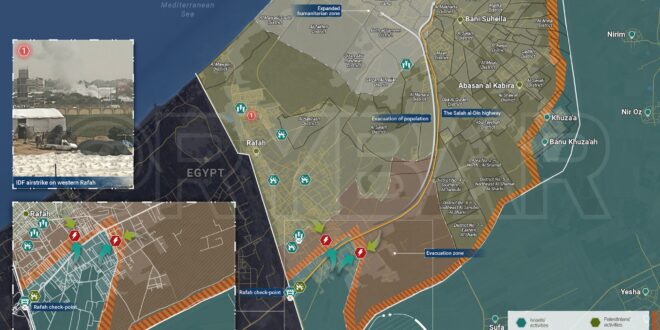A top Israeli security official said he expected ‘another seven months of fighting’ in Gaza will be needed to defeat Hamas. Israeli National Security Advisor Tzachi Hanegbi said in an interview with the Israeli Public Broadcasting Corporation (Kan), “We may have another seven months (that is, until the end of 2024) of fighting to consolidate our success and achieve our goals, that is, to destroy Hamas’s authority and its military capabilities.” Hanegbi added, “Victory for us means destroying Hamas’ military capabilities, returning all the hostages, and ensuring that by the end of the war there will be no more threats from Gaza.” He added, “In other words, there are no terrorist armies funded by Iran on our borders.”
An image generated by artificial intelligence, documenting part of the difficult humanitarian conditions in the Gaza Strip, was admired by tens of millions around the world within a few hours, according to a report by the American NBC News network. The picture shows a massive supposed gathering of tents in the devastated Palestinian Strip, with the words “All eyes on Rafah” written in the middle of it in English. The photo, which was published on Tuesday on the Instagram application of the giant technology company Meta, attracted more than 29 million shares in less than 24 hours. The publication of the photo came in the wake of an Israeli raid that killed at least 45 people and injured hundreds, in a camp for displaced people west of Rafah, in an incident that Israeli Prime Minister Benjamin Netanyahu considered a “tragic incident.”
Consultant and social media expert, Matt Navarra, considered that there is “an increasing trend towards publishing images such as (All Eyes on Rafah), as they do not contain any violence and contribute to conveying certain messages.” Navarra said “All Eyes on Rafah” highlights how activists can use artificial intelligence to create content that can deliver messages while adhering to platform rules. He considered that some caveats could be circumvented, because the “All Eyes on Rafah” image was created by artificial intelligence and there is nothing dangerous or widely controversial in it.
For his part, Mark Owen Jones, an associate professor of Middle Eastern studies at Hamad Bin Khalifa University in Qatar, who studies disinformation, said that the image “certainly appears” to be the result of artificial intelligence. He noted that among the signs that indicate that the image was created by artificial intelligence, is that it does not look realistic, and contains unusual shadows, pointing out that the group of tents is sprawling and unnaturally symmetrical.
War Termination
Israel delivered an updated proposal to the mediators involved in the negotiations, which includes general principles, including a “willingness to be flexible,” in order to reach an agreement to release hostages held by Hamas. The American website Axios quoted an unnamed source familiar with the negotiations as saying, “The written proposal, which was presented to the main mediators Qatar and Egypt, was detailed and expanded on the general principles presented earlier by the director of the Israeli Mossad, David Barnea, during the meeting in which It was held in Paris, on Friday, with the participation of the Director of the CIA, Williams Burns, and the Qatari Prime Minister, Mohammed bin Abdul Rahman Al Thani.
The source said that the updated Israeli proposal includes “a willingness to be flexible regarding the number of living hostages who will be released in the first phase of the deal,” in addition to “a willingness to discuss Hamas’ demand for sustainable calm in the Gaza Strip.” The source added: “There is a new and serious initiative.”
American and Israeli officials told the Axios website that the meeting held in Paris on Friday “made progress” towards resuming hostage-release talks in Gaza. A senior American official told the website: “There is progress in the discussions, and we are working closely with the Egyptian and Qatari mediators. These contacts will continue, as part of our endeavor to move the negotiation process forward.”
On Tuesday, the Egyptian “Cairo News” channel, which is close to state agencies, quoted a senior official as saying, “An Egyptian security delegation is trying to reactivate the truce and prisoner exchange agreement in coordination with Qatar and the United States.” Indirect negotiations between Israel and Hamas regarding a possible deal to release hostages in exchange for the release of Palestinian prisoners in Israeli prisons reached a dead end about two weeks ago, after days of talks in Cairo and Doha.
The previous negotiations revolved around a three-stage agreement that included a ceasefire in Gaza for a period of 42 days, during which the Israeli hostages would be released in exchange for Palestinian prisoners, leading to the exchange of bodies and the start of reconstruction in the third and final stage. However, reports at the time spoke of “several sticking points” between Israel and Hamas regarding this agreement, including Israel’s demand that Hamas release 33 hostages alive as part of the first phase of the deal. While Hamas proposed that the first phase include the release of 33 hostages, “dead or alive,” without specifying the number of hostages who would be returned alive, according to what the Haaretz newspaper reported .
“What’s new this time?” was a question that accompanied several parties’ announcement of an “anticipated round” of negotiations between Israel and Hamas in order to “reach an agreement” to release the Israeli hostages and reach a “humanitarian truce” in the Gaza Strip. Israel seeks to release all hostages held by Hamas within the framework of the truce. In return, the Palestinian movement adheres to ending the war completely, which is rejected by the Israeli government, as Israeli officials say that their country is open to a truce, but rejects the demands to end the war, until “the achievement of Victory and elimination of Hamas.”
Operational Update
Bombs used in the Israeli airstrike that killed at least 45 people in Rafah on Sunday were produced in the United States, said The New York Times (NYT). The outlet’s experts analyzed the visual evidence of the attack and concluded that “munition debris filmed at the strike location the next day was remnants from a GBU-39, a bomb designed and manufactured in the United States.” As NYT emphasized, the U.S. officials have pressed Israel to use more GBU-39s, which they say can reduce civilian casualties. Trevor Ball, a former U.S. army explosive ordnance disposal technician and one of the experts quoted in the NYT piece, identified the weapon in his post on X (formerly Twitter).
Operational Update – Gaza
Four IDF brigades are operating in Rafah, and in the last two days they began to expand the ground maneuver towards the center. Gaza war unit tracker @2023gazawar reported : ” Today the 98th Division left the Gaza Strip and ended the Jabaliya Raid. This means the 7th, 35th and 460th Brigades have withdrawn from Gaza. 7 and 35 are expected to move to Rafah alongside 98th Division in the coming days, while 460th returns to its base in the Negev (as it is a training brigade). 1 source indicated that 98th Division will move to the Lebanese border instead of Rafah, but I personally think this is unlikely. We’ll see I guess. 7 brigades remain throughout Gaza, 2 under 99th Division in Netzarim and 5 under 162nd Division in Rafah. The withdrawal of 98th Division is premature. Not all of Jabaliya was recleared, and 2 of the 3 reformed Hamas battalions in the area remain intact. I think Nahal Patrol will probably be returned to Nahal & Bislamach Patrol goes back to Bislamach. 277 could go to Givati or 35?… Multiple people have indicated to me that 98th Division’s Jabaliya Raid is set to end some time around next week. 460th Brigade is set to return to training (as it is a training brigade), 35th and 7th Brigades will likely move to Rafah together with the 98th Division.”
The US administration provided clarifications for what could be considered a “major operation” in Rafah, which may push Washington to change its policy towards Israel if it is implemented on the ground. White House National Security Communications Advisor John Kirby said in a press conference that a more complete definition of what he considers a “major ground operation” in Rafah could lead to a change in US policy towards Israel. However, he pointed out that Israel’s actions there have not yet reached that level. Referring to the concept of the “big operation,” Kirby said, “We did not see them storming Rafah, and we did not see them entering with large units and large numbers of forces in columns and formations in the form of a coordinated maneuver against multiple targets on the ground. This is the big ground operation.. We did not see that.”
In response to a question about reports that Israeli forces advanced into the center of Rafah, Kirby said, “What I understand, and I think the Israelis talked about this, is that they are moving along the so-called Philadelphia Corridor, which is located on the outskirts of the city, and not within the city limits.” Kirby added, “We did not see a major ground operation, and these tanks were moving along a corridor that they previously told us they would use on the outskirts of the town to try to pressure Hamas.”
The IDF reported that the fighters of the 401st Brigade’s combat team destroyed a kilometer and a half long underground route where there were dozens of anti-tank missiles and other weapons. “The route splits into a number of different paths and at different depths. The entire route is a kilometer and a half long and contained several side doors. In the raid, many weapons, short-range anti-tank missiles, Kalashnikovs, explosive charges and grenades were found inside. The route contains a living space, toilets and additional rooms. All the roads and the compounds were destroyed”
The Israeli army confirmed that it had “achieved operational control” over the Philadelphia axis, located on the border between Egypt and the city of Rafah, south of the Gaza Strip. The Israeli army spokesman, Avichay Adraee, said via X that the Israeli forces were able “in recent days” to “achieve operational control” on the Philadelphia axis on the border between Egypt and Rafah. He added, “The Philadelphia Corridor was used as an oxygen artery for Hamas, which it used to smuggle weapons into the Gaza Strip on a permanent basis.”
He pointed out that the Israeli forces “found along the axis dozens of missile platforms ready to be launched and launching pits that Hamas used to launch rockets and mortar shells towards Israeli territory.” He stated, “Hamas took advantage of the Philadelphia axis and established its infrastructure a few dozen meters away from the Egyptian border so that it would not be targeted.” He said: “In recent weeks, Hamas has fired about 70 rocket and mortar shells from the Rafah area. So far, our forces have found about 20 tunnels in the Philadelphia Axis area, and we are studying and thwarting them.” Adraee attached his tweet to a video clip that showed what he described as “missile launching pads” and “rocket shells.”
In light of the continued Israeli attack on Rafah, attention has once again turned to the “ Philadelphia axis ”, which is seen more than ever as a strategic axis for the “Hamas” movement (which the United States classifies as terrorist), and has been in the crosshairs of the Israeli army regularly since. The beginning of the war in Gaza.
More than 20 tunnels were located by the IDF near the Philadelphia axis, some of which cross into Egypt. The IDF informed the Egyptians and is working to investigate the tunnels. Another 82 shafts were found by the forces near the Philadelphia axis. In addition, dozens of rockets were located near the Egyptian border ready for launch, in launch pits and temporary buildings. According to IDF data, in recent weeks 70 rockets have been launched from the Rafah area. A senior Egyptian official denied in the Egyptian media that there was any discussion with Israel regarding tunnels on the Philadelphia route that cross.
In recent weeks, the fighters of the 401st Israel Defense Forces, in cooperation with the Yalam unit and 504, have been operating under the 162nd division in East Rafah, in the southern Gaza Strip, with the aim of locating terrorist infrastructures and underground routes. So far, during the activities of the fighters, many terrorists have been eliminated and dozens of terrorist infrastructures of the Hamas organization have been destroyed.
The Chief of Staff, Maj. Gen. Hartzi Halevi, today (Wednesday), held a situation assessment and tour of the Rafah area in the Gaza Strip with the commander of the Southern Command, Major General Yaron Finkelman, the commander of Division 162, Brigadier General Itzik Cohen and other commanders. “Look, we are here for several reasons,” said the Chief of Staff, “one, this is the last brigade left with all the full capabilities, so we want to disband the Rafah Brigade. But we will deepen the achievement and we will bring Hamas to places Very low, it requires a lot of professionalism, it requires a lot of determination, it requires a lot of values, to know that dismantling Hamas completely is a national mission of the State of Israel…. I am very, very impressed, I leave here with the feeling that there is a very, very professional, very high-quality work here,” he continued, “There is learning here, it is a very, very important thing. You are making progress, there are very high achievements here.”
“This is the last remaining brigade with all the capabilities, so we want to dismantle the Rafah Brigade. We will deepen the achievement and we will bring Hamas to very low places. It requires a lot of professionalism, it requires a lot of determination, it requires a lot of value, Knowing that dismantling Hamas completely is a national mission of the State of Israel.”
The Wall Street Journal, citing a high-ranking Egyptian official, reported that Israel is trying to justify its military operation in Rafah by claiming that it discovered tunnels extending across the border from the Gaza Strip to Egypt. The source, which the newspaper did not name, indicated that “Israel did not provide Cairo with any information regarding the discovery of 20 tunnels in the Philadelphia Corridor area (a 14-kilometre-long buffer zone on the Gaza Strip border with Egypt).” He added: “Israel is using these statements to justify the continuation of the operation in Rafah.” At the same time, a representative of the Israeli military administration told the Wall Street Journal that Tel Aviv informed Cairo of the discovery of new cross-border tunnels.
An Egyptian official accused Israel of using allegations of the existence of tunnels on the border with the Gaza Strip to justify its military operation in Rafah in the southern Gaza Strip, according to what Cairo News Channel reported, citing a “senior Egyptian source.” The channel, which is close to Egyptian intelligence, quoted the senior source as saying, “There are no communications with the Israeli side regarding the allegations of the existence of tunnels on the Gaza Strip border with Egypt.” The source added, “Israel is using these allegations to justify continuing the Palestinian Rafah operation and prolonging the war for political purposes,” stressing that “the Israeli media reports that talked about the presence of tunnels on the Egyptian border with the Gaza Strip are incorrect.”
The Israeli National Security Advisor, Tzachi Hanegbi, had indicated in an interview with the Israeli Public Broadcasting Corporation (KAN) that Israel must “ensure with the Egyptians that smuggling does not occur through tunnels” under the border. As of 2013, Egypt destroyed hundreds of cross-border tunnels with Gaza, which it said were used to transport fighters and weapons during the war that Cairo waged for years against Islamist rebels in North Sinai.
An Israeli military official said that Israel had established “operational control” over the strategic Philadelphia axis along the border between the Gaza Strip and Egypt. The Philadelphia Corridor is 14 kilometers long and extends along the border with Egypt, from the Mediterranean Sea in the north to the Kerem Shalom crossing in the south. The axis is located within the scope of a buffer zone that was agreed to be established between Israel and Egypt. Hanegbi said in the interview that Israel “must close the border between Egypt and Gaza.”
Since the outbreak of the most violent war ever in Gaza, in October, Israel has repeatedly spoken of ongoing smuggling through tunnels under the border. But the head of the Egyptian State Information Service, Diaa Rashwan, had previously accused Israel of using allegations to justify its illegal occupation of the Philadelphia Axis. In January, Rashwan said that Egypt had completely destroyed these tunnels, established a buffer zone, and strengthened border control in a step that “makes any smuggling operation impossible, whether above or below the ground.”
Tensions have been rising between Israel and Egypt, the first Arab country to recognize the Hebrew state, since the Israelis ignored international warnings and went ahead with a ground operation in Rafah earlier this month. Control of the Philadelphia axis comes only weeks after Israeli forces took control of the Rafah border crossing with Egypt, on May 7. On Tuesday, Israeli tanks were stationed in the center of the city of Rafah, where the United Nations says 1.4 million people, the majority of whom are displaced, are taking shelter.
Iron Swords An analysis conducted by the Sanad News Verification Agency on Al Jazeera Network found that the area of the Gaza Strip shrank by about 32% due to the buffer zone and the continuing Israeli operations in the border areas and related military axes within the territory of the Gaza Strip . These operations, which began since October 7, have not stopped. The first last until today. The occupation army has expanded the areas of the buffer zone that it intends to establish on the border strip with the Gaza Strip, while it continues systematic bombing and demolition of neighborhoods, residential buildings, and facilities near the border, the effects of which were monitored until this May.
The results of analyzing and monitoring the destroyed areas via satellite images show that the total area of the Gaza Strip has eroded by approximately 120 square kilometers, or up to 32% of the total area of the Strip (360 square kilometers), as this percentage may increase in light of the continuation of Israeli operations. The area of the border buffer zone, in addition to the Netzarim axis, is approximately 96 square kilometers, equivalent to 26% of the area of the Gaza Strip, in addition to about 24 square kilometers of the area of the destroyed areas connected to the buffer zone, amounting to 6% of the total area of the Gaza Strip. The result of the shrinking area is 32%.
This comes amid Israeli statements about the establishment of a buffer zone deep in the Gaza Strip and along the borders of the Strip, claiming that it is a temporary and undeclared area for the purpose of disarming the Islamic Resistance Movement ( Hamas ), according to Israeli media. Despite US Secretary of State Anthony Blinken’s statement on January 23, 2024, clearly stating the United States’ position on opposing any permanent change in the territorial composition of Gaza and rejecting any permanent displacement of its population, the widespread bulldozing and removal operations continue until now, and Israel has previously revealed its need for more than 100 giant D9 bulldozers used to expand and accelerate the process of establishing the buffer zone.
Operational Update – Judea-Samaria
A report was received of a drive-by attack near Nablus in the Samaria Division where two people were seriously injured. Many IDF forces began a pursuit of a terrorist who carried out a drive-by attack at one of the entrances to Nablus. IDF forces searched for the suspects who fired from Tulkarm earlier today at nearby Israeli settlements. The terrorist fled to Nablus and turned himself in to the Palestinian security forces, after many IDF forces searched for him.
At the same time, IDF Shin Bet and MGB fighters operated tonight to arrest eight wanted persons throughout Judea and Samaria. In a two-division operation in the villages of Seir and Shioh in the Etzion and Yehuda divisions, in which many forces took part, dozens of suspects were interrogated and terrorist funds and weapons were confiscated. In Hebron, in the Yehuda Brigade, the fighters arrested two suspects who incited terrorist activity, in Deir Tzamat a wanted person was arrested and an M16 type weapon was confiscated, and in the villages of Yatta and Tarkomiya two wanted persons suspected of terrorist activity were arrested. Two more wanted men were arrested in Beit Aur Athata in the Binyamin Brigade.
During the operation of the night forces in Tubas, in the Bekaa and Emekim Division, three IDF soldiers were slightly injured by an explosive device. One soldier was treated at the spot, two other soldiers were evacuated for medical treatment at a hospital, their families were informed. So far, since the beginning of the war, about 4,000 wanted persons have been arrested throughout the Judea and Samaria Division and the Bekaa and Emekim Division, about 1,700 of whom are associated with the terrorist organization Hamas.
Operational Update – Lebanon
Following the alerts that were activated in the north of the country about the infiltration of hostile aircraft, the air defense fighters successfully intercepted two unmanned aircraft that crossed over Lebanese territory using the ‘Iron Dome’ system. Fighter jets attacked this evening a terrorist infrastructure of the Hezbollah terrorist organization in the al-Khyam area in southern Lebanon. In addition, the IDF attacked with artillery fire in the areas of Hamol, Kfar Kila and Ankora in southern Lebanon.
Golani Brigade fighters have been in a defensive battle on the northern border for about four months, during which they are stationed in the first line of defense, carrying out ambushes and patrols on the fence and hitting Hezbollah terrorists on the border.
The air defense fighters intercepted a suspicious aerial target over the maritime space in the area of Rosh Hankara, no warning was activated according to policy. During the night, Air Force fighter jets attacked a military building where Hezbollah terrorists were staying in the Naqura area, alongside the organization’s terrorist infrastructure in the Ramiah and Tiri areas in southern Lebanon. The IDF forces attacked with artillery the sources of the fire from which the launches towards a planted area were identified last night (Tuesday).
The Mujahideen of the Islamic Resistance targeted Maya at 09:15 a.m. on Wednesday 5/29/2024. They equipped the newly developed spy equipment at the monk site with appropriate weapons and directly hit it, leading to its destruction.
Lebanon’s Hezbollah announced its new attacks against the positions of the Zionist army in the north of the occupied territories by issuing statements. Lebanon’s Hezbollah Information Department announced: In support of the stable Palestinian nation in the Gaza Strip and their brave and noble resistance, the fighters of the Islamic Resistance targeted the Zebedin position located in the occupied fields of Shaba’a with missile weapons at 6:10 p.m. today, Wednesday, the 29th of May 2024. And they hit it directly.
In another statement of Lebanon’s Hezbollah, it is stated: In support of the stable Palestinian nation in the Gaza Strip and their brave and noble resistance, at 6:10 p.m. today, Wednesday, the 29th of May 2024, the fighters of the Islamic Resistance attacked the Samaqah position located in the occupied Kafr Shuba hills with missile weapons. They took aim and hit it directly. In addition to this, today at 6:00 PM local time, Lebanese Hezbollah fighters targeted the Zionist position of ” Ramiya ” located in the north of the occupied territories with artillery shells.
Earlier, Lebanon’s Hezbollah issued a statement announcing a combined attack against the Zionist position of ” Al-Baghdadi ” located in the north of the occupied territories. Lebanon’s Hezbollah announced: We carried out successive combined attacks against al-Baghdadi’s position. At the beginning, we targeted this position, the guard and the presence of Israeli enemy soldiers in it. In the continuation of the Lebanese Hezbollah’s statement, it is stated: After the missile attack, we targeted al-Baghdadi’s position with suicide drones carrying bombs.
Lebanon’s Hezbollah stated: Islamic resistance fighters targeted the operation room of this position and its surveillance room. Suicide drones also accurately hit their targets. In the continuation of this statement, it is emphasized: the combined attack on al-Baghdadi’s position resulted in several explosions, and as a result, this position was set on fire. This attack resulted in the definite damage of Israeli enemy soldiers.
Operational Update – Syria / Iraq
According to the report of Mehr news agency , citing SANA, media sources announced that the Syrian air defense has confronted some hostile targets in the sky of this country. SANA reporter reported that the Syrian air defense has targeted some hostile targets in the skies of Homs city.
According to Mehr News Agency , during the Zionist regime’s missile attack on some areas of Syria, a number of Syrian citizens were martyred and injured. On Wednesday night, Russia’s Ilyum news website quoted a military source as reporting that the Israeli fighter jets targeted a military site in the center and a residential building in the city of Banias on several occasions, as a result of which a child was martyred and 10 other civilians were injured.
This military source added: At around 19:30 this evening, the Zionist enemy launched an air attack from the Lebanese territory and targeted a site in the central region and a residential building in the city of Banias in the coastal region. The news media in Syria also announced that the Zionist enemy carried out an air attack from the side of the occupied Golan on targets in the city of Homs located in the west of Syria. These sources added: Syrian air defense countered this attack and shot down some of the missiles fired by the enemy, but during this attack material damage was done. Previously, the Zionist regime has repeatedly tried to attack various targets in Syria, and in most cases these attacks have been countered by the Syrian air defense.
Operational Update – Yemen
Local sources said that an unknown drone crashed today, Wednesday, in Al-Wadi District in Ma’rib Governorate (eastern Yemen). The sources added that a drone, likely American, fell today in the desert of Ma’rib Governorate near the Al-Alam Front, north of Al-Wadi District. The sources indicated that the circumstances of the plane crash and the party following it were not known.
The Yemeni military media published video footage of the shooting down of an American MQ-9 Reaper drone while it was carrying out a hostile mission in the airspace of Marib. Yemeni air defenses successfully shot down an American MQ-9 Reaper while it was carrying out hostile activities in the airspace of Marib, the spokesperson for the Yemeni Armed Forces (YAF) announced on Wednesday. Brigadier General Yahya Saree confirmed that the drone was targeted with a locally-made surface-to-air missile.
He added, “The downing of the plane came just days after another plane of the same type was shot down in the skies of Al-Bayda province.” The video clip shows the American plane being spotted in the airspace of Marib and then a Yemeni-manufactured surface-to-air missile was launched in its direction. The footage showcases the moment the missile directly hit the American plane, and its debris fell to the ground.
This makes it the 6th $30 million drone to be shot down by the Yemeni forces since operations were initiated in support of Gaza. Simultaneously, a Defense Department official, as quoted by Sputnik, stated that the US government is aware of reports that a US MQ-9 Reaper drone was shot down by what they describe as Houthi rebels over Yemen earlier that day but currently have no additional information to provide. “We are aware of reports but do not have anything to share at this time,” the official stressed.
The Yemeni Armed Forces announced the implementation of operations targeting 6 ships in the Red, Arab and Mediterranean Seas, for violating the decision to ban access to the ports of occupied Palestine. It indicated in a statement that the naval forces, the air force, and the missile force in the Yemeni armed forces, with the help of God Almighty, carried out six military operations, as follows: Three military operations in the Red Sea, the first targeted the ship (LAAX), which was directly hit and severely damaged.
The statement added that the second operation targeted the ship (MOREA) and the third operation targeted the ship (Sealady). The three operations were carried out with a number of naval and ballistic missiles and drones, and led to direct casualties, thanks to God. The Yemeni Armed Forces confirmed the implementation of two military operations targeting the American ships (ALBA) and (Maersk HARTFOFD) in the Arabian Sea, and the targeting operation was carried out with a number of missiles and drones.
It pointed out that the sixth military operation targeted the ship (MINERVA ANTONIA) in the Mediterranean Sea with a number of winged missiles, and all the aforementioned ships were targeted for violating the decision to ban access to the ports of occupied Palestine. The Yemeni Armed Forces affirmed: In the face of the continued Israeli crimes against our brothers in the Gaza Strip, they will not hesitate, with the help of God Almighty, to target all ships that deal with the Israeli entity in the declared area of operations, regardless of their destination, as stated in their previous statements. At the end of its statement, the Yemeni Armed Forces saluted the valiant Palestinian resistance in the Gaza Strip and all the free people who support it in Lebanon and Iraq, and affirmed the continuation of their military operations until the aggression stopped and the siege on the Palestinian people in the Gaza Strip was lifted.
The Iranian Tasnim News Agency reported on Wednesday that Tehran had provided the Houthi rebels in Yemen with a “Ghadr” ballistic missile that is launched from the sea.” The Iran-aligned Houthi group has launched more than 50 attacks in the Red Sea region since November, as part of what it says is a campaign of solidarity with the Palestinians, although many of the ships it tried to target have nothing to do with Israel. It later expanded the scope of its attacks to include the Indian Ocean. The “Ghadr” missile is an improved version of the “Shahab-3A” missile. It is also referred to as “Ghadar-101” and “Ghadar-110”.
Tasnim reported that inspired by Iran, the Yemeni military forces have obtained the technology to manufacture anti-ship ballistic missiles. Iran’s first homegrown naval ballistic missile, called ‘Qadr’, was developed by late Iranian commander Brigadier General Hassan Tehrani-Moqaddam more than a decade ago. Iran’s technical know-how to produce such anti-ship missiles is now at the disposal of the Yemeni military forces. Patterned after the Iranian missile, Yemen’s ‘Muhit’ (Ocean) missile is capable of detonating naval targets.
The Yemeni Army has been in possession of surface-to-air missiles for many years. After the invasion of Yemen by a Saudi-led coalition in March 2015, the Yemeni forces converted the SAMs into surface-to-surface missiles, known as Qaher-2 and Qaher-2M, which carried out many successful operations against hostile targets. The Ansarullah forces have also unveiled an anti-ship version of the Qaher missile in military parades. Like the Iranian Qadr, Yemen’s Muhit missile is equipped with an optical seeker that can home in on hostile warships.
It indicates that Iran has acted successfully in supporting the resistance front across the region. Iran has empowered the resistance groups by providing them with modern technologies. Such policy has led to the formation of an integrated command and control center in the region, specifically in the drone and missile sectors.
Maps
All maps are lies. “Not only is it easy to lie with maps, it is essential,” wrote cartographer Mark Monmoneir in his book How to Lie with Maps. He showed that condensing complex, three-dimensional spaces onto a two-dimensional sheet of paper [in old days] is bound to be reductive.
But it is impossible to comprehend the war in Gaza without reference to maps, otherwise the entire conflict is reduced to an endless series of meaningless acts of random violence and the suffering of civilians. The first characteristic of guerrilla warfare is the loss of a front line.
Evidently, different mappers have different ideas of how to depict the war in Gaza, notably those that seek to depict Israeli progress in the ground campaign. Part of the problem is latency. The news that forms the basis of the maps takes time to filter out to mappers, and the cartographers take time in crafting their maps, and it takes time to curate them. These processes are uneven among mappers, so their maps may differ in detail. Probably there is some ideological bias, or at least thematic apperception, which is understandable in wartime. It may come as no surprise that al-Jazeera maps depict rather less Israeli territorial progress than other sources.
Finally, there remains the epistemological question of just exactly what are the colored in areas depicting. Naively, this might be understood as areas of Israeli control, that are no longer contested by the HAMAS. Or possibly these are areas of Israeli presence, in many of which the possibility of an RPG-wielding HAMAS militant popping out of a tunnel unexpectedly remains a live possibility. With the “zero-range” combat characterized by small unit tactics on both sides, maps may be prey to a fallacy of misplaced concreteness.
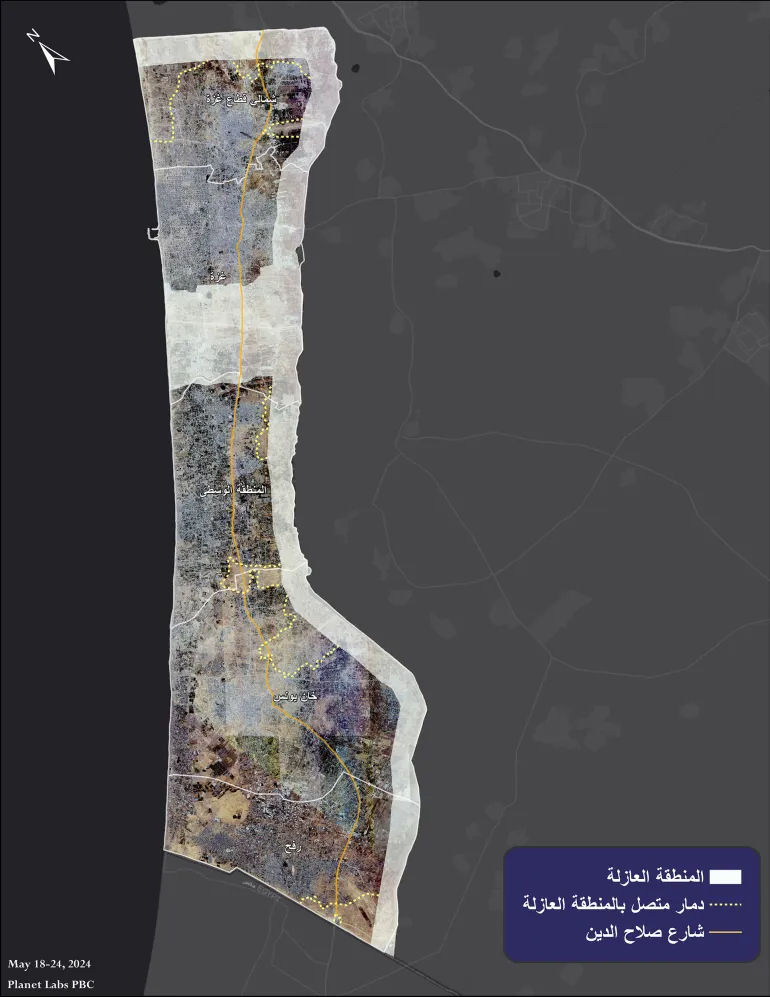
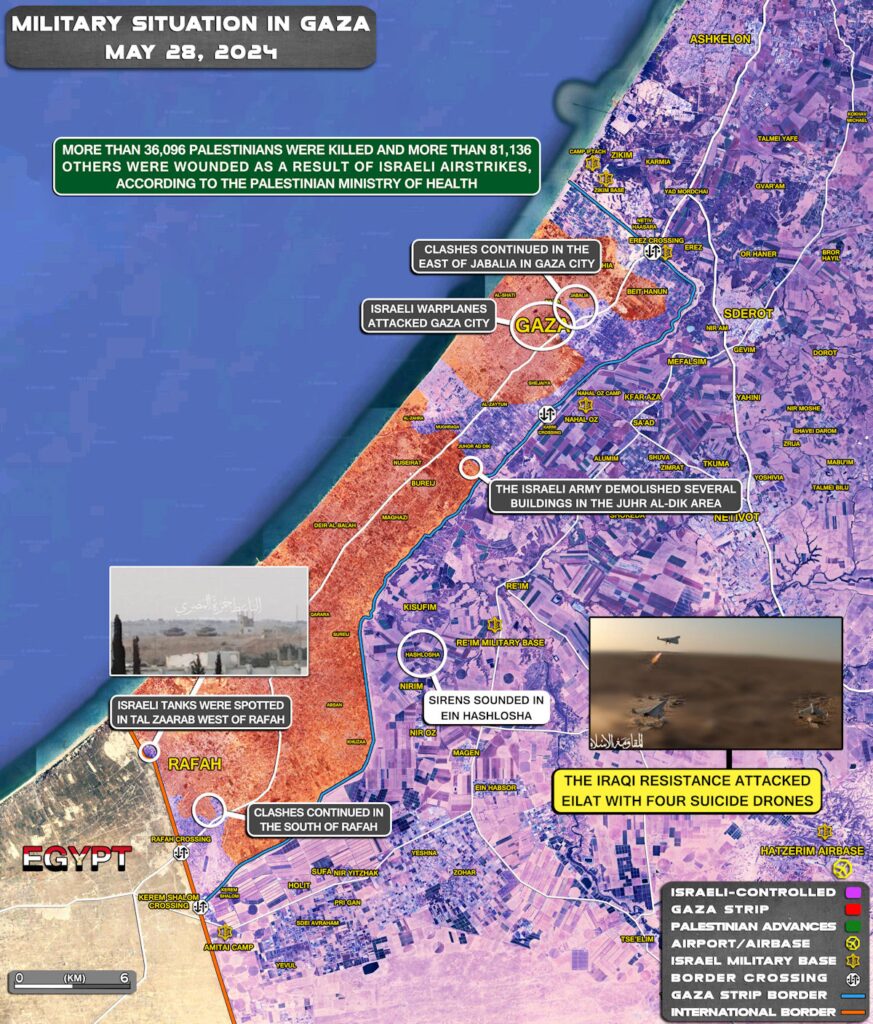
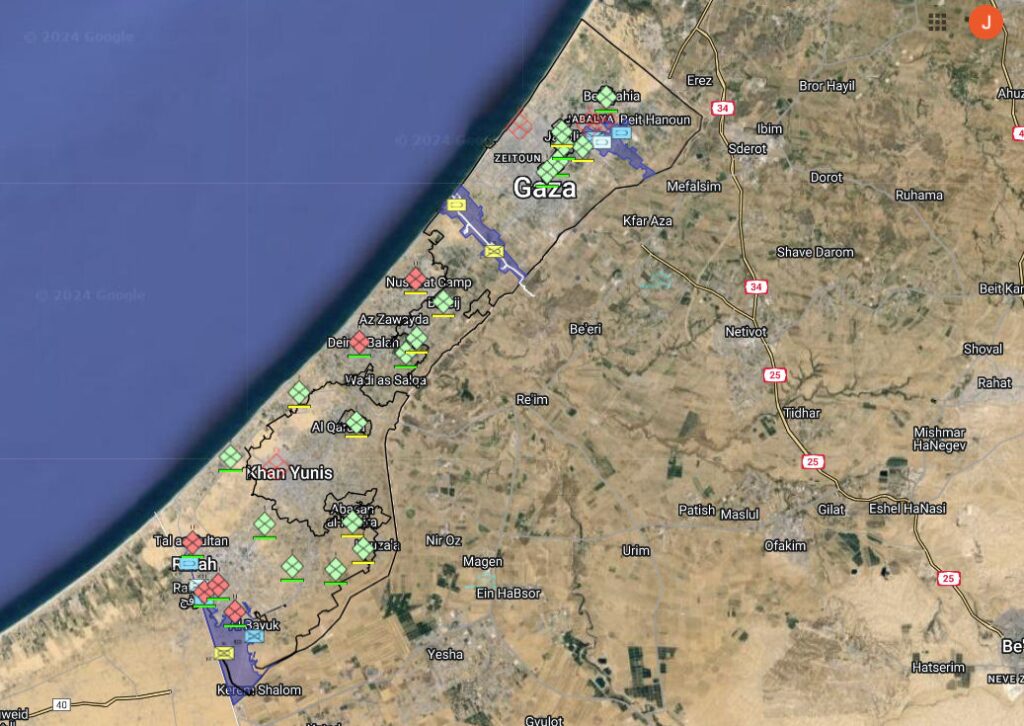
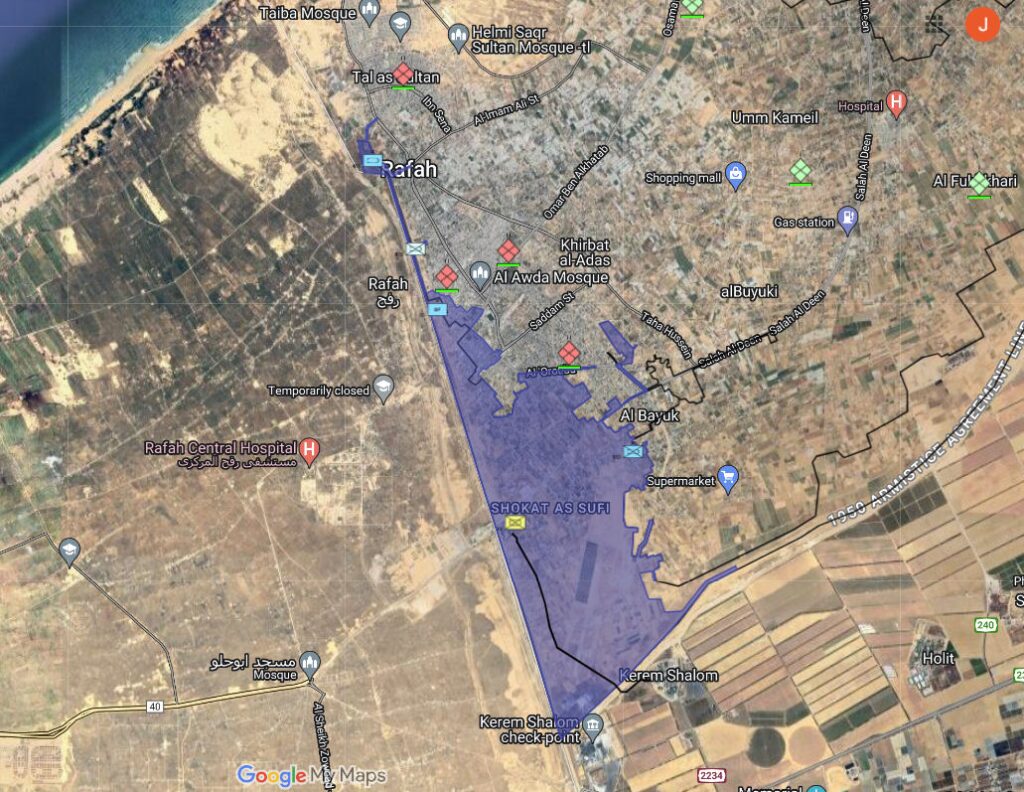
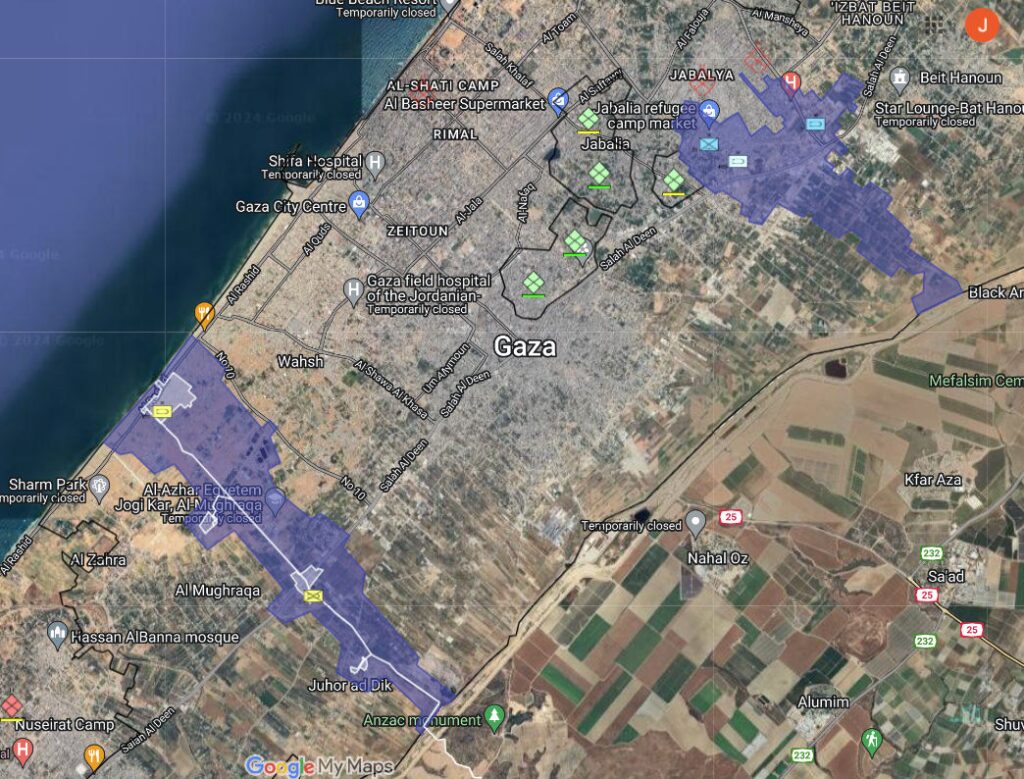
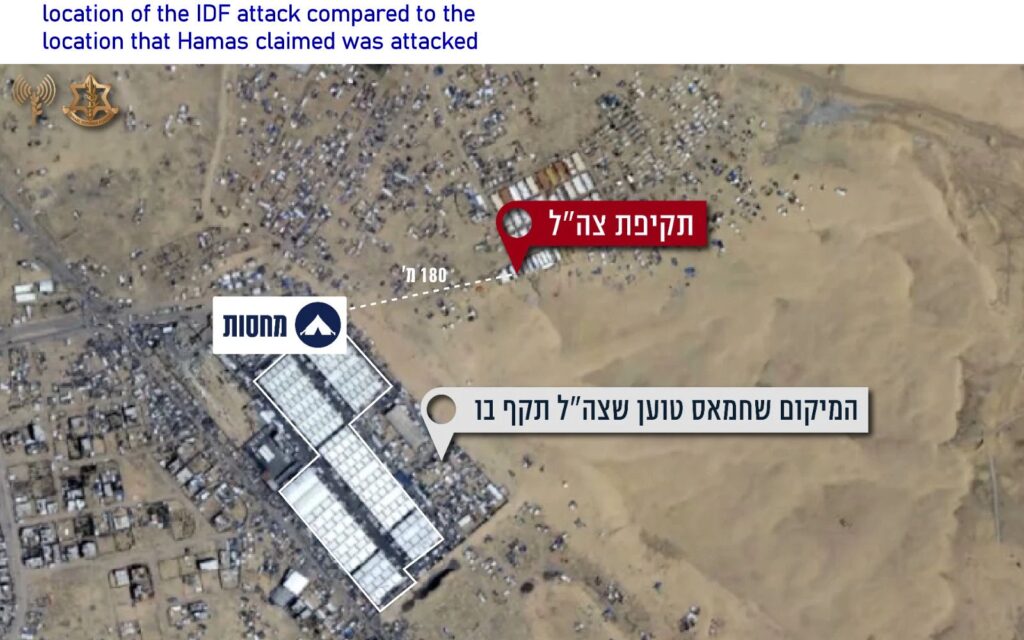
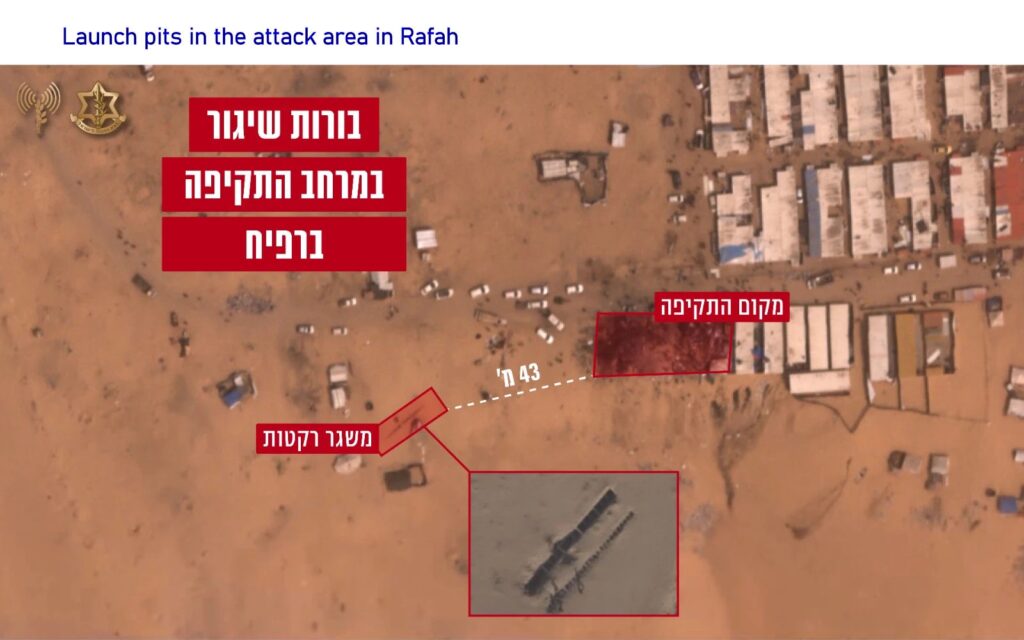
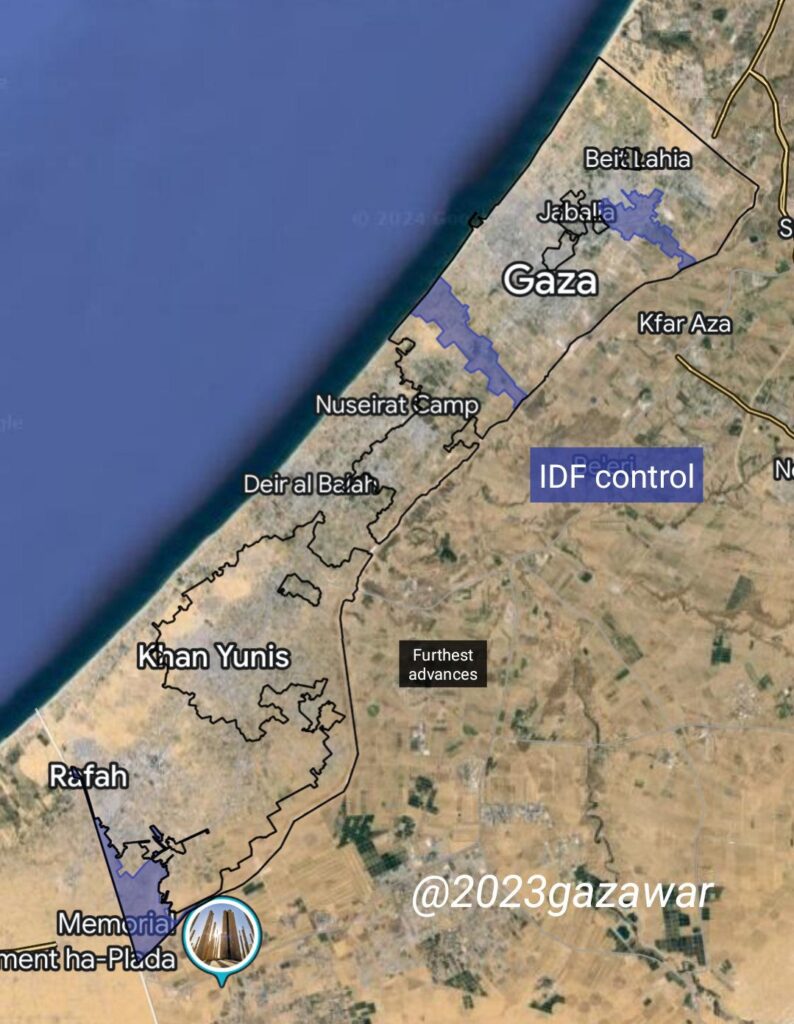
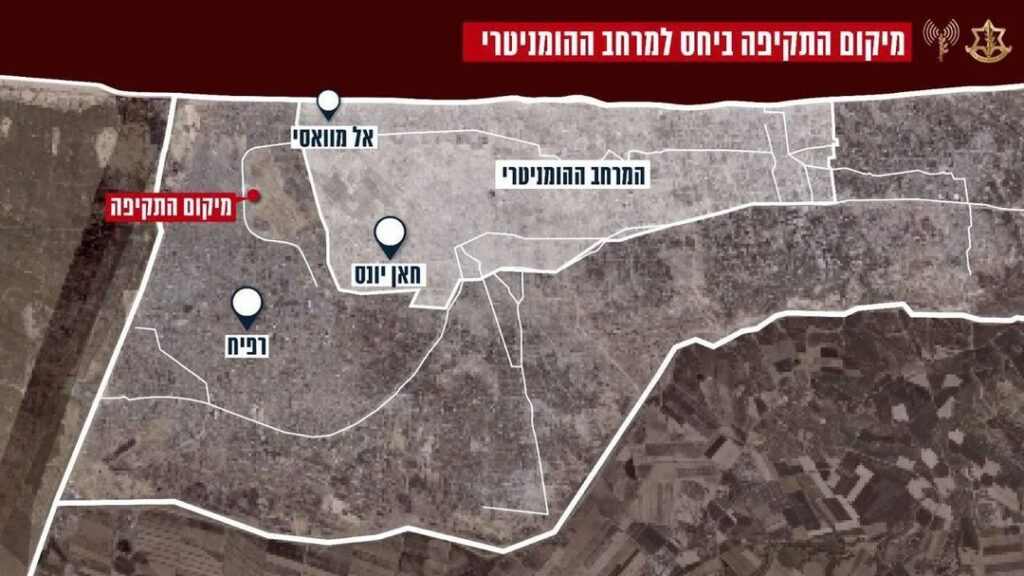
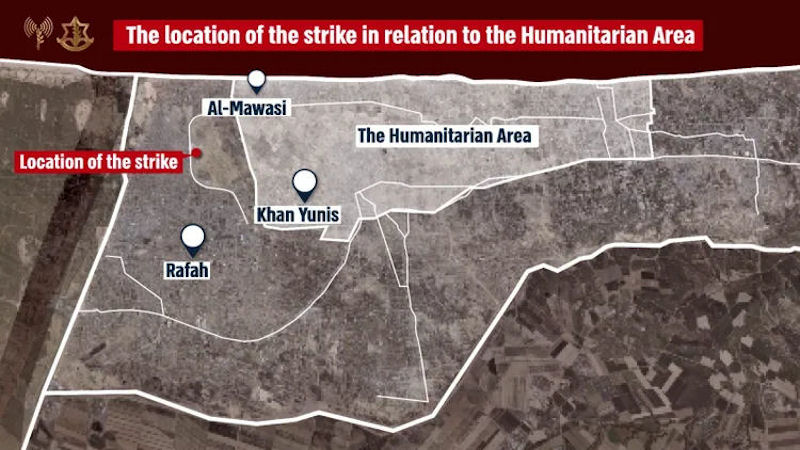
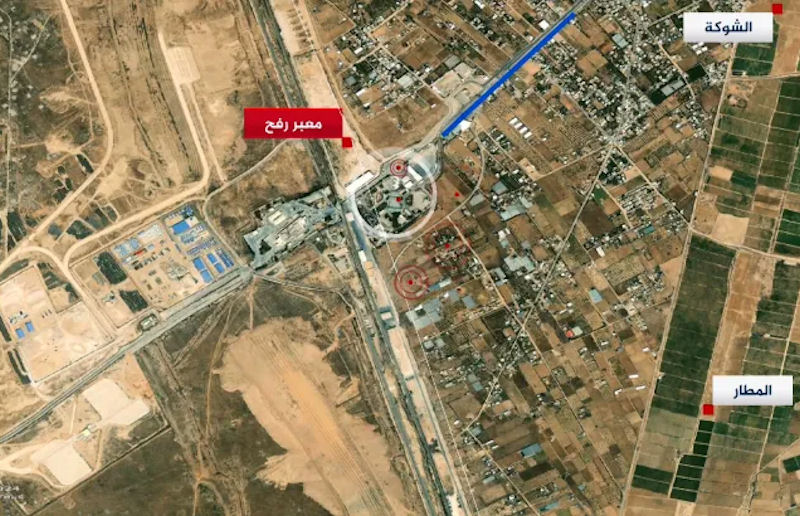
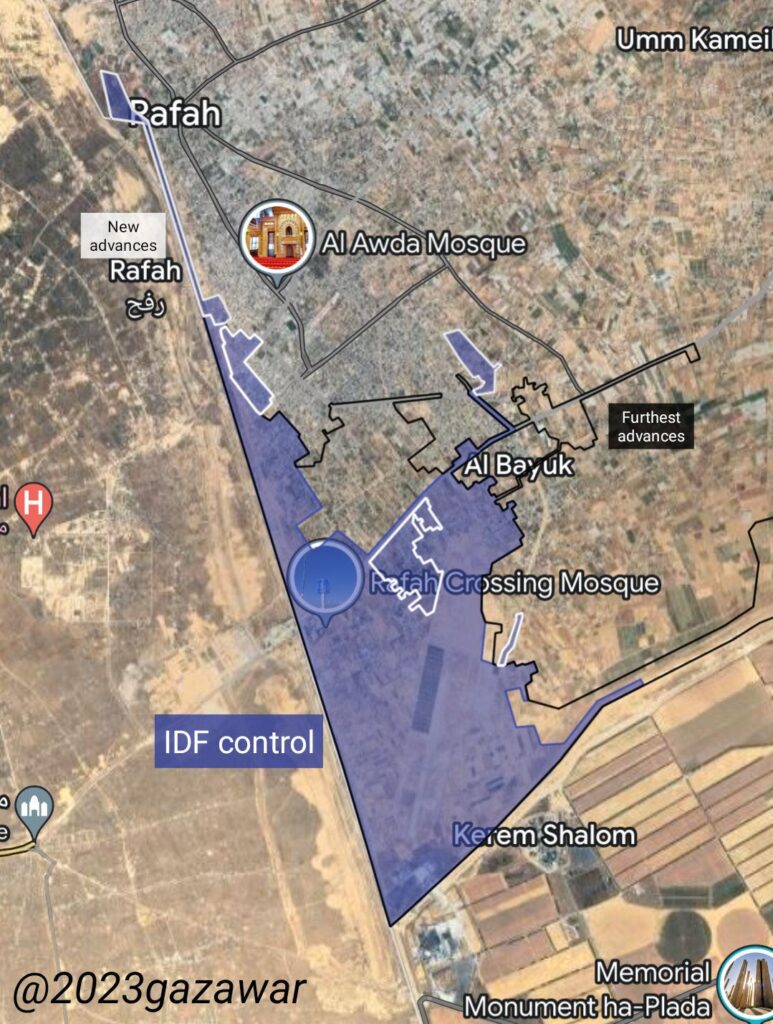
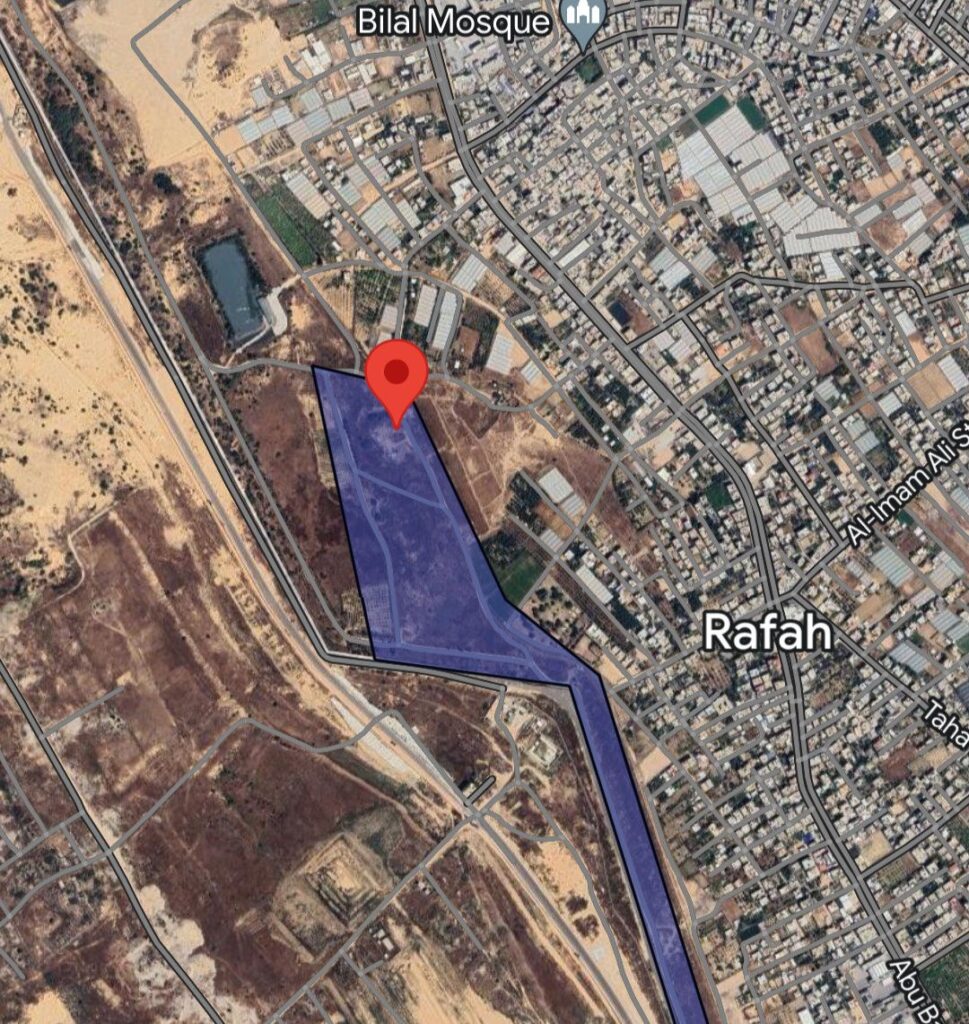
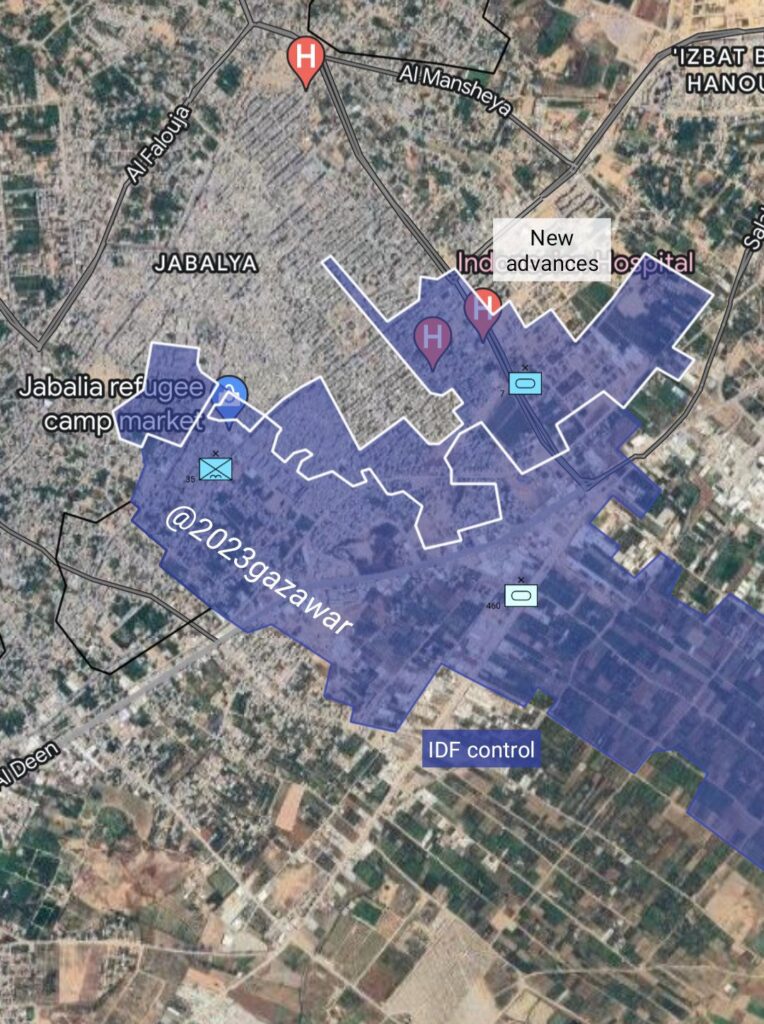
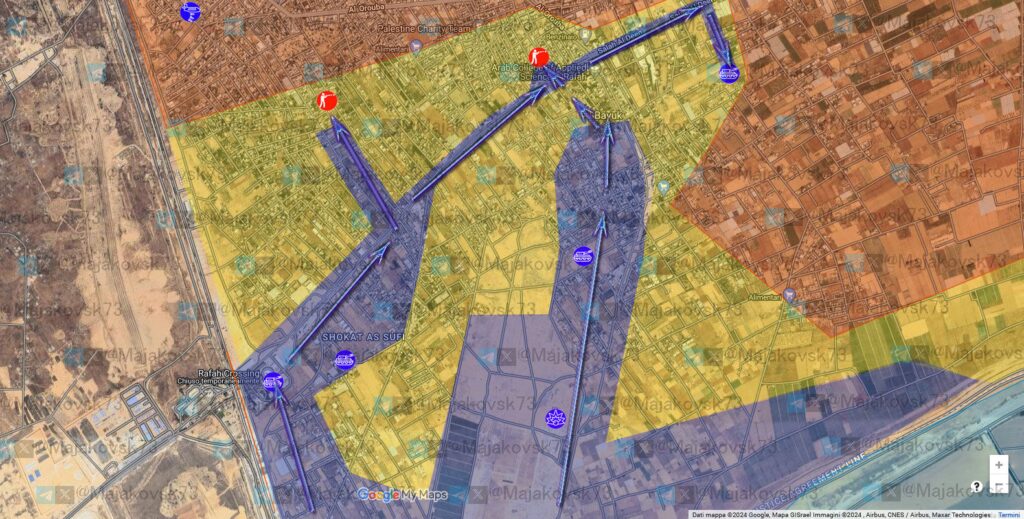
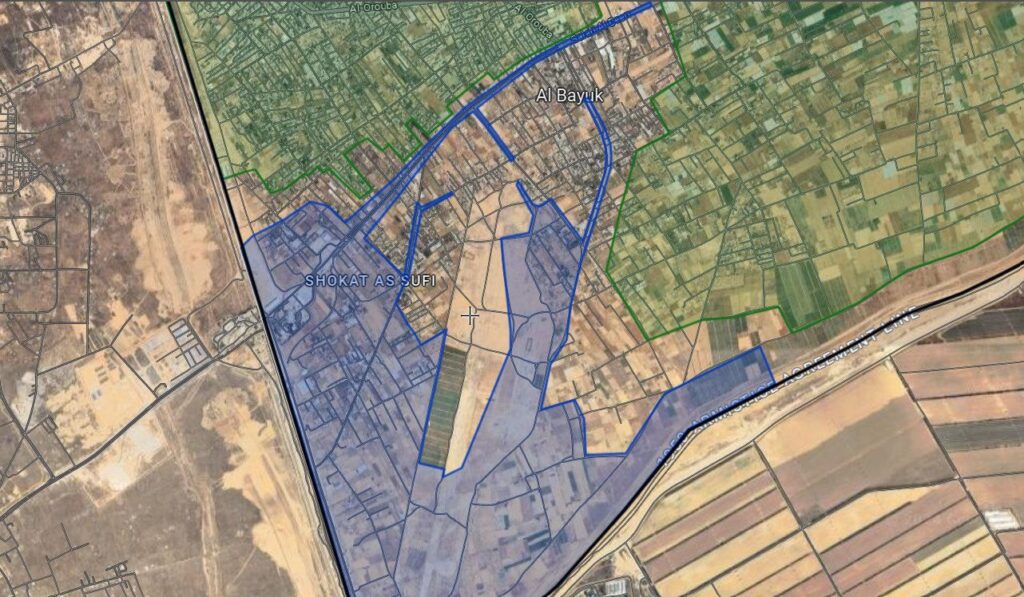
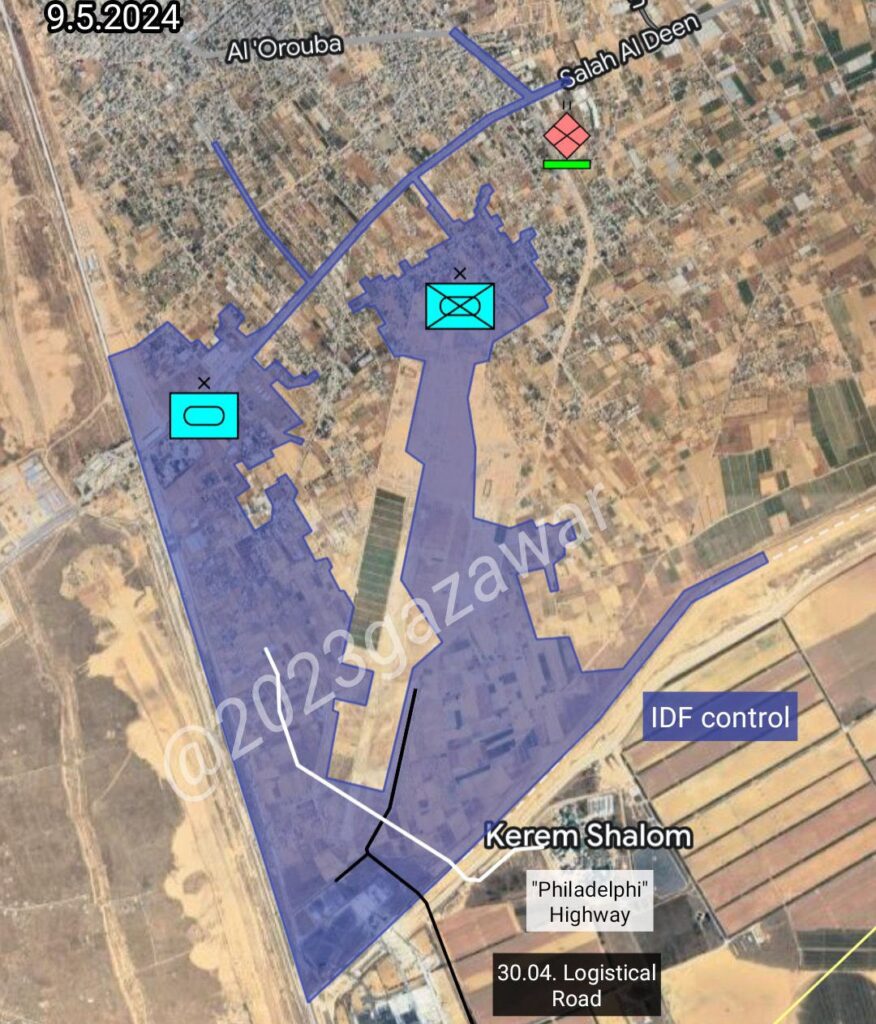
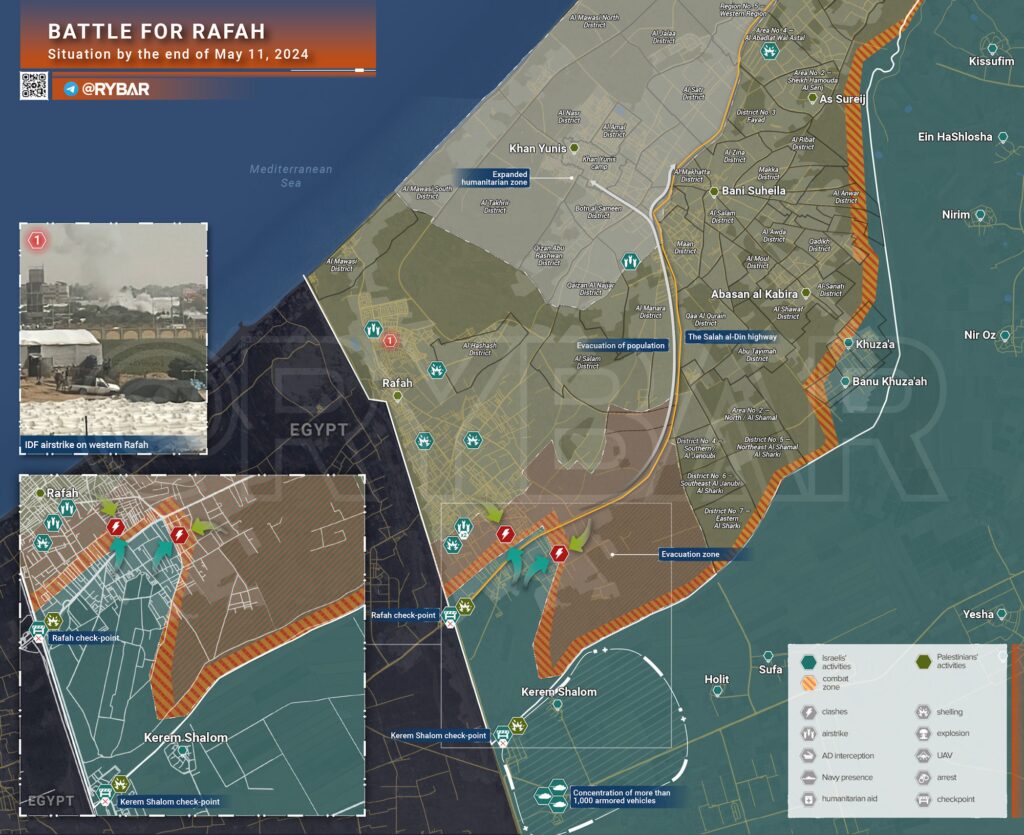
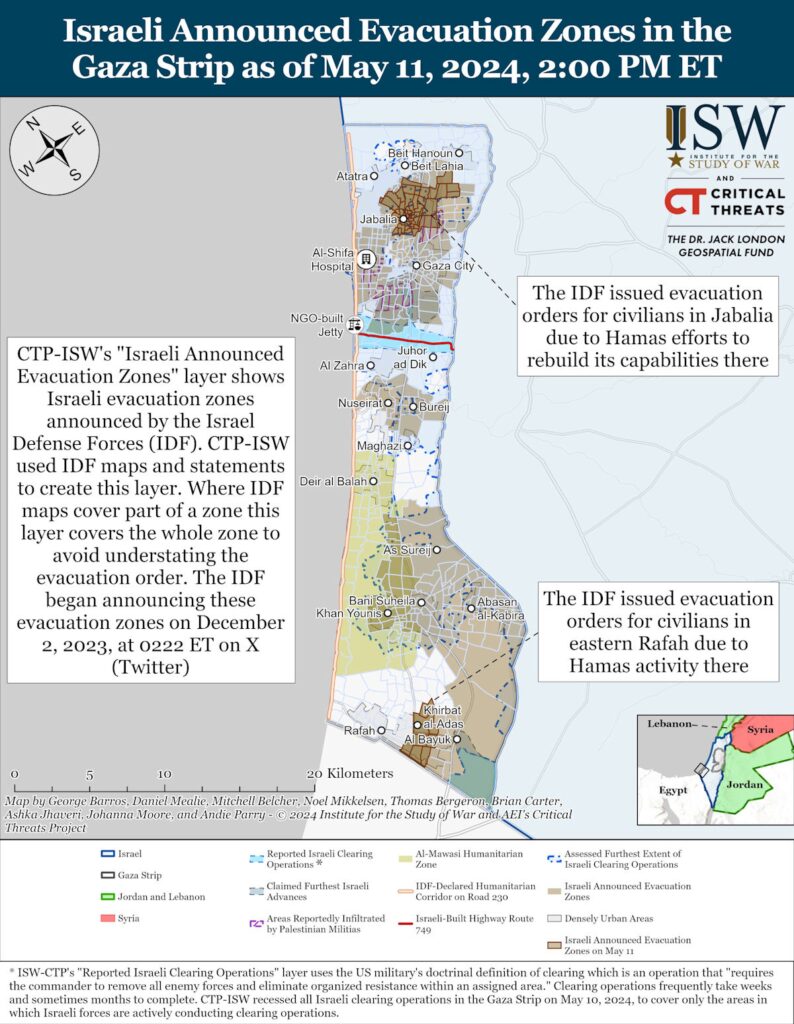
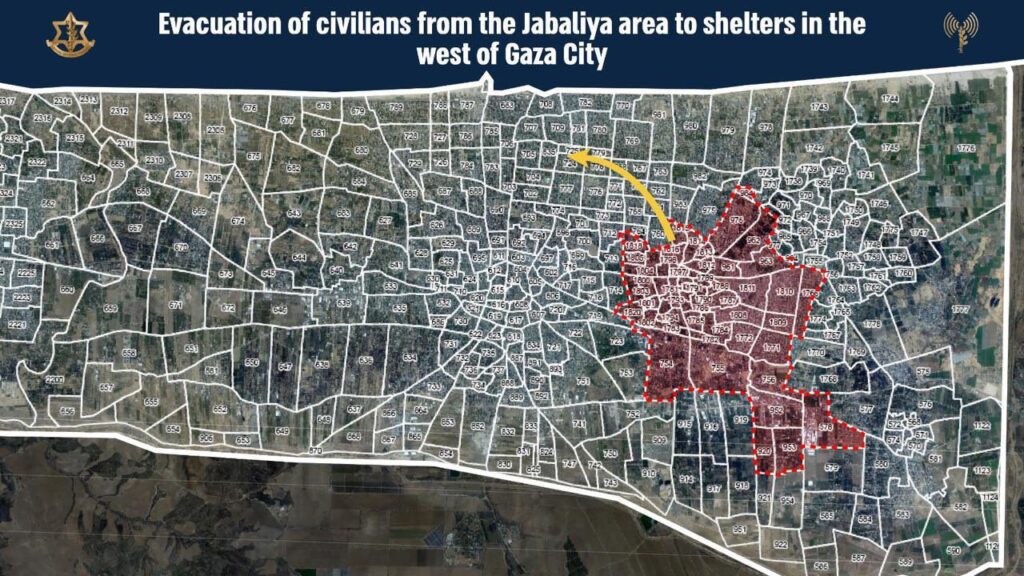
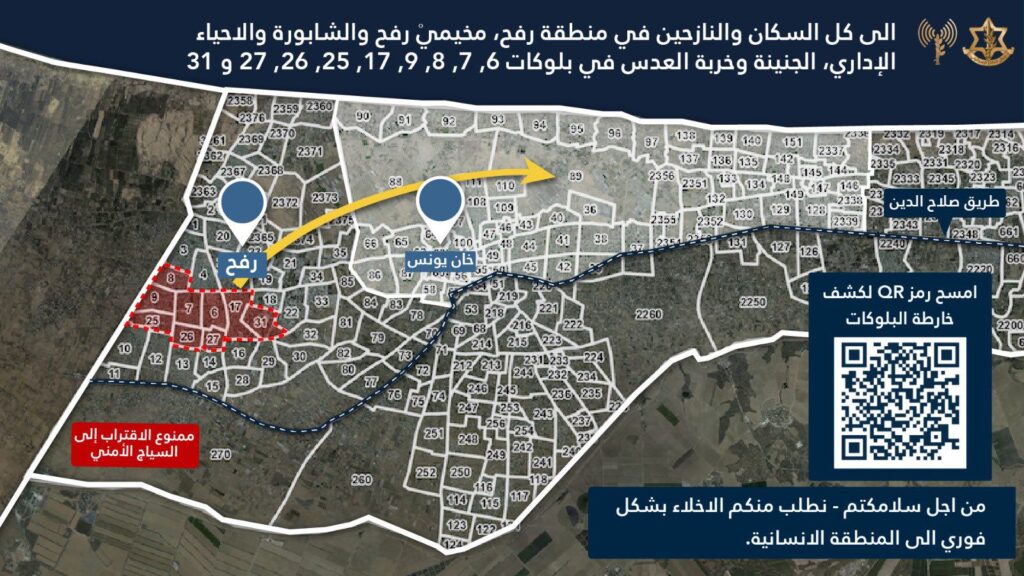
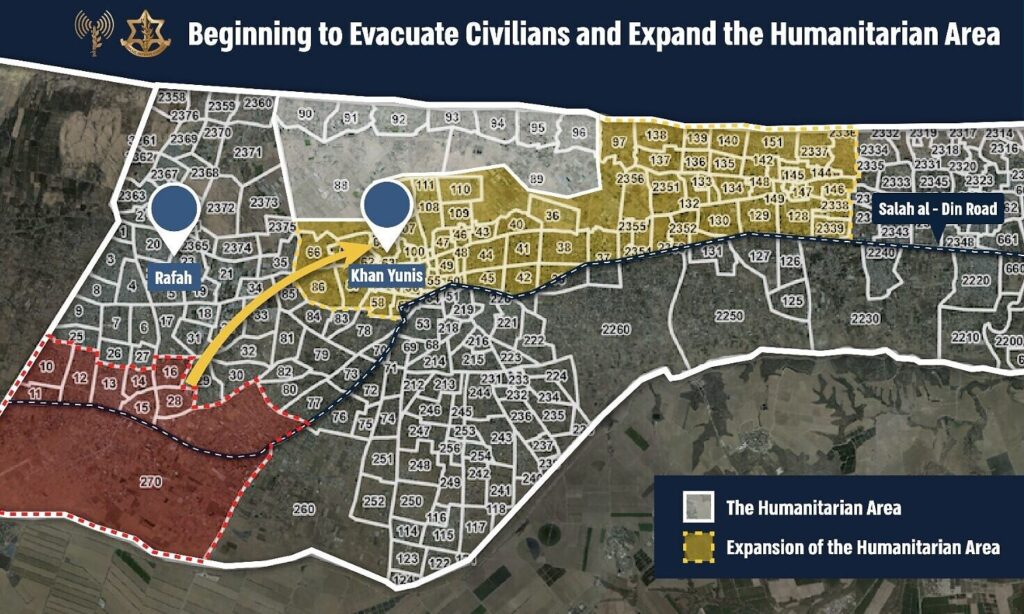
Bystanders
The World Food Programme (WFP) urgently appealed for a ceasefire in Rafah and across Gaza, emphasizing the dire conditions faced by forcibly displaced individuals, including children. In a post on X, the WFP highlighted the exhaustion of those affected and the declining capacity to provide assistance as time passes. The organization stressed the immediate necessity for a ceasefire to address the worsening humanitarian situation in the region.
The Médecins Sans Frontières (MSF) organization called for an immediate end to the bombing in Rafah and Gaza. Chris Lockyear, MSF Secretary-General, said, “Civilians are being massacred. They are being pushed into areas they were told would be safe only to be subjected to relentless airstrikes and heavy fighting,” adding, “Entire families, made up of dozens of people, are crowded into tents and living in extremely difficult conditions. Over 900,000 people were forcibly displaced again as Israeli forces intensified their offensive on Rafah in early May.”
In a statement on Wednesday, the MSF relayed that staff and patients at an MSF-supported trauma stabilization point in Rafah’s Tal al-Sultan were forced to leave the facility amid the increasing aggression only 24 hours after the IOF bombed tents in what it called a “safe zone”, killing at least 49 people and wounding over 250 others. The Israeli army claimed responsibility for the strike, claiming it was a “precision” attack to assassinate Hamas members.
Dr. Safa Jaber, an MSF gynecologist who is in the Tal al-Sultan tents with her family, expressed. “All of last night we heard clashes, bombings, and rockets being fired. Nobody knows what exactly is happening,” noting, “We are scared for our children, scared for ourselves. We were not expecting this to happen suddenly. Where shall we go? We are struggling to find the basics that every human being needs to stay alive.”
The statement also called “Israel” out for disregarding the order by the International Court of Justice (ICJ) to “immediately” halt its military attacks in Rafah and let in humanitarian aid. With that being said, it described all nations supporting “Israel” as “morally and politically complicit.” It urged the United States, United Kingdom, and allied European Union Member States to pressure “Israel” to stop the blockades and attacks. It added that the shutdown of the MSF-supported trauma point in Tal al-Sultan came after an Israeli airstrike on the Kuwaiti hospital in Rafah killed two staff and put the hospital out of service.
The International Federation of Red Cross and Red Crescent Societies (IFRC) called on Wednesday for a ceasefire and unimpeded humanitarian access to the Gaza Strip, where millions of people face worsening hunger amid a humanitarian catastrophe nearly seven months into the war on Gaza. “We desperately need a political solution that will allow us to have a ceasefire to get aid in,” IFRC President Kate Forbes said as quoted by Reuters in an interview in the capital, Manila. “We’re ready to make a difference. We have to have access, and to have access there has to have a ceasefire,” she added.
Describing the situation in Rafah as “atrocious” during a visit in February, months before “Israel” launched a military assault on the southern Gaza city, Forbes said, “There was no not enough housing. There was no water, there weren’t enough sanitation toilets. We had a hospital with no equipment… and unfortunately what I was afraid of has happened, and there wasn’t going to be enough food.”
“I plead with the governments on all sides to negotiate a ceasefire so that we can get aid in,” she said. “My job is to ensure that when it [ceasefire] happens, we can give the aid that’s necessary. And so they need to do their jobs so I can do my job,” the IFRC president added.
The World Central Kitchen charitable organization announced the cessation of its work in Rafah, south of the Gaza Strip , due to the ongoing Israeli attacks in the governorate. The non-governmental organization is based in the United States and provides meals to the displaced in Gaza. “In the face of Israeli operations in Rafah, countless families are forced to flee again,” she said late Tuesday. She added, “The continuing Israeli attacks forced us to stop work in our main kitchen in Rafah, and to move many of our local kitchens to areas further north.”
The charitable organization recently resumed its work after stopping it following the killing of 7 of its workers in 3 Israeli air strikes on their cars last April. The killing of the workers – an Australian, three Britons, an American, a Palestinian and a Polish – sparked global outrage against Israel .
Axis of Resistance
Lebanese Hezbollah resistance movement’s leader likened Israel to the Nazis, predicting the regime’s downfall amid growing outrage over its atrocities in Gaza. Seyed Hassan Nasrallah likened the Israeli regime to the Nazis in Germany during World War II, stating that the regime has little chance of surviving the increasing public anger over its crimes in Gaza.
“I see no future for this Nazi regime in the region,” said Nasrallah in a televised speech on Tuesday. Nasrallah said that Israel’s brutal bombardment of refugee tents in the city of Rafah in Gaza over the weekend would only hasten its collapse and disintegration. He said the attack demonstrated that the Israelis are even worse than the Nazis, who committed heinous crimes across Europe. “The occupying regime lacks conscience or moral principles and it is worse than the Nazis,” he stated.
Nasrallah said Israel’s response to international calls for a halt to attacks on Gaza was a devastating airstrike. He said the scale of the attack on Rafah, evident in the disfigured bodies of children left behind, showed how “savage, treacherous, and ruthless” the Zionists are.
Muqtada al-Sadr, confirmed today, Wednesday, that democracy and American promises are a double standard, while pointing out that those who claim humanity support Zionist terrorism in Gaza. Al-Sadr said in his speech, “Any other country or ruler did what the Zionists did, of bombing the camps and leaving behind the burned bodies of women and children in a horrific way that shames humanity, or what the representative of the Zionists did of tearing up United Nations resolutions in front of the eyes of people and countries, and so on.” His act of public defiance of the decisions of the International Court of Justice would have made the world stand still.”
He added, “American democracy and freedom and its tails are deceptive and apply double standards, as it forbids that to some and permits it for its spoiled daughter, the state of the Zionists,” wondering, “What logic is this, what justice is this, and what democracy or freedom is this? Rather, it is just arrogance, arrogance, injustice, and bloodshed.” He continued, “It closes its eyes and deafens its ears to these massacres, genocide, and ethnic cleansing,” pointing out that it “stands against every freedom other than the freedom of the sons of Zion and the sons of homosexuality.”
According to Mehr reporter , “Ali Bagheri”, Acting Minister of Foreign Affairs of Iran, at the ceremony commemorating the anniversary of the death of Imam Khomeini (RA) titled “Palestine and Resistance in Imam Rahel’s Intellectual System”, while expressing his condolences for the martyrdom of the martyrs of service, he said: “We employees and We lost the members of the foreign policy apparatus, the head of Iran’s diplomacy and the leader of the resistance diplomacy, the martyred Amir Abdollahian. He continued: Our revolution has always been more fruitful with pure blood and the enemies have never been able to gain anything from these injuries. Although the loss of these loved ones has been a loss for us.
Acting Minister of Foreign Affairs of our country said: We are and will remain the soldiers of Ayatollah Khamenei. Imam (RA) created an innovation in the path of the Islamic Revolution. He said: In the field of foreign policy, Imam Rahel was the first person who was able to implement a foreign policy based on religious thinking. Acting Minister of Foreign Affairs said: threats by our nation have always been turned into great opportunities; The continuation of the Islamic Revolution is the movement of resistance, and this movement is inspired by the Islamic Revolution, but the Westerners want to insinuate that the movements of resistance are dependent on Iran, while in reality this is not the case.
He continued: The currents of resistance have reached maturity and make their own decisions. Bagheri added: Our foreign policy is based on ideology and this is the reason for the independence of our foreign policy. Other countries pursue their foreign policy due to the defined share for them, but the foundation of the foreign policy of Imam (RA) is independence.
The Commander of the Quds Forces of the Islamic Revolutionary Guard Corps, Brigadier General Ismail Qaani, considered the “Al-Aqsa Flood” operation to have made the end of the Zionist entity imminent, and made it taste a defeat that he will never forget and will not be able to compensate for. He said: The Zionist entity today is in its weakest stage and is on the verge of extinction. The Palestinian Information Center reported that this came in a statement by the commander of the “Quds Forces” in the Revolutionary Guard, Brigadier General Ismail Qaani, who, accompanied by Sayyed Mojtaba Abtahi, Secretary-General of the Conference to Support the Intifada of the Iranian Islamic Shura Council, visited the office of the “ Hamas ” movement in Tehran, and held a detailed meeting. With the movement’s representative, Khaled Al-Qadoumi.
During the meeting that took place on Tuesday , Brigadier General Qaani praised the legendary steadfastness of the Palestinian people and their resistance in the face of the arrogance of the Zionist enemy and its aggression that has been continuing for 8 months and its commission of the most horrific crimes in the war of genocide that it is practicing against the defenseless residents of the Gaza Strip. He denounced the recent massacre committed by the Zionist occupation in Rafah, which claimed the lives of more than 45 displaced people, most of whom were children and women, stressing that this is the behavior of the Zionists, whose crimes were exposed to the world.
Brigadier General Qaani said: The Zionist entity today is in its weakest stage and is on the verge of extinction, pointing out that the “ Al-Aqsa Flood ” operation made the end of this entity imminent, and made it taste a defeat that it will not forget and will not be able to compensate for.
For his part, the Hamas representative briefed the commander of the Quds Forces on the latest developments in the situation in the Gaza Strip, especially with regard to the recent horrific massacre committed by the Zionist enemy against the displaced in Rafah. Al-Qaddoumi stressed that this massacre is a reflection of the occupation’s field failure in confronting the valiant Palestinian resistance, which for 8 months has been displaying the most wonderful meanings of valor and heroism in defending Palestine and the Islamic nation.
Al-Qaddoumi stressed that the Palestinian resistance inflicted on the enemy a terrible defeat during the eight months on the Gaza Square, parallel to the defeat it suffered as a result of the “Al-Aqsa Flood” operation on the seventh of last October. He also gave an explanation about the humanitarian situation in the Gaza Strip and the necessity of concerted efforts to save its steadfast people from the threat of famine, thanking the Islamic Republic of Iran for standing by the Palestinian people and their just cause.
Turkish President Recep Tayyip Erdogan described the head of the Israeli occupation government, Benjamin Netanyahu, as a “demented vampire,” criticizing the international community’s silence regarding the massacres committed by the occupation army in the Gaza Strip. Erdogan said in his speech, during the meeting of the parliamentary bloc of his party (Justice and Development), today, Wednesday, that “the world is directly following the brutality of the demented vampire (Israeli Prime Minister Benjamin) Netanyahu .”
He said: “No belief justifies killing innocent civilians by burning them in tents, and the world is directly following the brutality of the vampire called Netanyahu,” referring to the holocaust committed by the occupation army against the tents of displaced people in Rafah. Erdogan pointed out, “Israel killed humanity in Gaza, and Europe killed its values, and trampled all the principles that were the reason for its existence.” He considered that the hands of the United States and European countries have become “partners in the blood-sucking practiced by Israel by remaining silent.”
Allied for Democracy
Israeli War Cabinet member Gadi Eisenkot expressed Wednesday serious concerns about the current government’s handling of the war in Gaza and the northern front with Hezbollah. Eisenkot dismissed the notion that dismantling a few battalions in Rafah could lead to the quick return of the Israeli captives, calling it an “illusion,” according to the Israeli Army Radio. He emphasized that stabilizing the region was a highly complex task that could take between three to five years, followed by many more years to establish a new authority.
“The idea of ‘complete victory’ is nothing more than a slogan,” Eisenkot said, pointing out Prime Minister Benjamin Netanyahu’s failures on both security and economic levels. Eisenkot highlighted the difficulty of bringing back the captives, stating that they were dispersed across numerous locations, heavily guarded, and protected by armed personnel. He also noted that if elections were held in Gaza today, Hamas would likely emerge victorious despite the desires of the Israeli occupation’s leadership.
Expressing frustration over the diminishing influence of his faction within the cabinet, Eisenkot called for early elections to address the government’s waning effectiveness. He argued for the necessity of a preemptive strike on Lebanon to counter Hezbollah, criticizing the delayed response to Hezbollah’s operations, which kicked off on October 8 and have since been costly for the Israeli occupation.
An earlier investigation of the Israeli Channel 12 reported that during a cabinet meeting hours before the launch of an attack on Hezbollah on 11 October, Eisenkot walked up to the head of the military intelligence division in the army, grabbed him by the body, and addressed him: “Say, so that they can hear your opinion, do you think it is right to bomb Hezbollah tonight?”, The general proceeded to answer “no”.
Eisenkot advocated for tripling the number of personnel in the north and ensuring serious protection for the settlers in the region while promoting an agreement to strengthen UN Resolution 1701. Commenting Eisenkot’s statements, Channel 12 military commentator Nir Dvori said that “what Eisenkot is saying is not how they manage the battle, and this is not how they reach the goals, and a radical change must be made if we want to be worthy of the price you pay in the Gaza Strip.” “Israel in this way is going to destruction,” a Channel 12 military commentator said.
In response, the Likud party accused Eisenkot and former Security Minister Benny Gantz of seeking excuses to end the war prematurely and withdraw from the government at a critical time. Likud spokespersons criticized them for focusing on narrow political interests instead of striving for “victory”, which top Israeli brass argue is near-impossible to achieve at this point. Eisenkot had said Monday that Hamas “renewed its forces” and that the fighting in the Gaza Strip is expected to “continue for years”, Israeli news website Ynet reported. What needs to be done now “is to reach the end of fighting in Rafah and at the same time move forward along the path of a hostage deal, in which we will cease fire for 42 days or double that,” Eisenkot was quoted as saying during a session in the Foreign Affairs and Security Committee.
“There is no [trade-off] between releasing prisoners in exchange for ending the war,” he further said, noting that negotiating a deal involving captives is crucial from a strategic standpoint. “As we stopped in November for a short break, we stopped for 42 days. And even if we need more than that, it does not mean we will end the fighting,” he added.
Eisenkot’s remarks come at a critical juncture as the Israeli public advocates for an exchange deal without a clear post-war strategy after 8 months of fighting, during which the Israeli army did not attain any declared war objectives. These challenges are compounded by collapsed negotiations due to Israeli obstinacy and its military operation in Rafah. On Sunday, the former head of Mossad Danny Yatom said that “time is running out” for the Israeli captives in Gaza, that “Israel” will fail to achieve any of its war objectives, and that Gaza will remain the way it is.
Even if the army “remained in Gaza for several more months, fighting over and under its lands, they would still not be able to kill every Hamas fighter or even the majority of them,” he added. The army would also fail to destroy the Resistance’s infrastructure in Gaza or even its majority, he further said.
Eisenkot’s remarks, on the other hand, signify a clear and explicit challenge, particularly in light of the regime’s refusal to comply with orders of the International Court of Justice. The ICJ effectively ordered “Israel” to cease all its operations in Rafah. The Palestinian resistance for its part affirmed that it will not engage in negotiations until a permanent ceasefire is reached and the Israeli forces withdraw from the Gaza Strip. Meanwhile, the fighting continues across the entire Strip, where Israeli forces suffered significant losses, as reported by Israeli sources.
For months after the October 7 attacks, a slogan in Hebrew spread almost everywhere across Israel. It was already a tangible reality after the unprecedented escalation from Hamas. Its words were “Together we will win.” But as the war continues, the different trends seem to have taken over again. , to show strong differences within Israeli society. Unlike what was the situation after the attack, when everyone avoided differences and there was one goal, which was to respond to Hamas in Gaza, Israeli cities are currently witnessing large marches demanding the departure of Prime Minister Benjamin Netanyahu, and holding him and those negligent in confronting the October 7 attacks accountable.
The government coalition is also witnessing a major rift, as the minister in the war government, Benny Gantz, on Sunday submitted a proposal to the Cabinet Secretariat to form a government investigation committee into the October 7 attacks and the subsequent war in the Gaza Strip, according to the Times of Israel newspaper. This was preceded by Gantz’s threat to withdraw from Netanyahu’s government by June 8, if the latter does not clarify in detail who should govern Gaza after the end of the current war, but it seems unlikely that the proposal will be adopted by the government.
The views of Gantz, along with him and Defense Minister Yoav Galant, differ with Netanyahu regarding the war, and of course with the hard-right ministers in the government, National Security Minister Itamar Ben Gvir, and Finance Minister Bezalel Smotrich, as the latter demanded “the occupation of Gaza, the return of Israeli settlements there, and the displacement of the Palestinian population.”
Political analyst, Joab Stern, said in telephone statements to Al-Hurra website that this division in the Israeli street “began after the families of the kidnapped people realized that the government is not primarily concerned with returning their relatives, and does not deal with the issue as a priority.” The war began in the Gaza Strip after an unprecedented attack carried out by Hamas on Israeli territory on October 7, killing more than 1,170 people, most of them civilians, according to an Agence France-Presse count based on official Israeli data. During the attack, 252 people were taken hostage and transported to Gaza. After a truce in November allowed the release of about 100 of them, about 121 hostages remain in the Strip, including 37 who died, according to the army. The Israeli attack on the Gaza Strip in response to Hamas left more than 36,000 people dead, most of them civilians, according to the Ministry of Health in the Strip.
Stern added that the dispute turned into “a partisan political one. The hard right had one position and Gantz and the opposition had another position. Then other points of disagreement emerged related to the arrangements for the day after the war in Gaza, and the alternative to Hamas rule, which caused the rift and internal division.”
But Meir Masri, professor of political science at the Hebrew University in Jerusalem, has a different point of view, as he saw that “there is no transformation within Israel, but rather a return to the lines before October 7th.” Masri explained in statements to Al-Hurra: “Israel, like any other democratic, pluralistic society in the world, witnesses differences in visions and differences in viewpoints regarding most issues.”
With Gantz’s threat, Netanyahu may lose his strongest political rival and his centrist bloc, which helped expand support for the government in Israel and abroad, even though the longest-serving prime minister in Israel’s history will still retain a majority in Parliament with the support of ultra-nationalist parties that have angered the United States. United States even before the war, according to Reuters. Political analyst Amotz Asa-El told the agency: “With regard to Parliament, it may continue for some time, and it will continue. But it will not last… Wars anywhere in democracies require consensus, require a government followed by the social mainstream, and a clear majority in the political system.” The research fellow at the Shalom Hartman Institute in Jerusalem added: “This will not achieve a narrow government, like the one that will remain for Israel after Gantz’s departure.”
Israeli Defense Minister Benny Gantz gave the War Council until June 8 to announce what he called “a clear national strategy regarding the war in the Gaza Strip and the tension on the northern front.” n Wednesday, he met with 3 leaders of the Israeli opposition parties: the head of the “There is a Future” party, Yair Lapid, the head of the “Israel Our Home” party, Avigdor Lieberman, and the head of the “National Right” party, Gideon Sa’ar, according to the “Times of Israel” newspaper. The three politicians agreed on what they called an “effective plan” to replace Netanyahu, for the “interest of Israel.”
The attendees announced their aspiration for the “National Camp” party led by Gantz to resign from the government, and to join their efforts. Speaking to Al-Hurra website, Stern said that the coming days will witness “an increase in political tension after Gantz’s deadline,” adding that “his withdrawal from the government will reduce the number of Knesset representatives supporting Netanyahu, and we will see more tension stemming from this division in visions regarding matters such as Gaza and the attack from the seventh of October.” He also pointed out the difficulty of the current situation, saying: “The government is a failure and is headed on the wrong path. If Netanyahu decides to change his course, the hard right will dissolve the government coalition,” adding: “This government must end its term.”
A member of the National Right Party, Ze’ev Elkin, acknowledged that this tripartite meeting “is a remarkable but not dramatic step, because the opposition does not, on the ground, have the appropriate means to overthrow the government.” The Israeli Broadcasting Corporation had quoted sources on Tuesday that a meeting between Lapid and Lieberman, and another between Lapid and Saar, preceded the tripartite meeting. Lieberman said during a press conference held in the Knesset on Monday: “Let us form a joint coalition so that we can overthrow this government and form another government.”
On Sunday, the Minister in the Israeli War Cabinet, Benny Gantz, submitted a proposal to the Cabinet Secretariat to form a government investigation committee into the October 7 attacks and the subsequent war in the Gaza Strip, according to what the Times of Israel newspaper reported. The government also faced disagreements over a new draft law on conscription, as Netanyahu’s hard-line partners insist on excluding religious institute students from compulsory conscription, while Galat and Gantz want military service that does not differentiate between Israelis.
Reuters quoted political analysts as saying, “Failure to reach an agreement may lead to the overthrow of the government, in light of the sensitivity of the issue to the Israelis, which became more sensitive during the Gaza war.” The agency quoted one of the ministers, on condition of anonymity, as saying that he “does not expect the government to survive.”
For his part, Masri believed that Netanyahu “is not inclined to the far right as is rumored, and the opposition he faces often comes from the right, as we saw in the recent soldier incident. The Prime Minister aligns his vision with the agendas of his allies within the coalition, which sometimes conflict. But in Ultimately, the decision remains the majority decision, and is governed by clear legal controls.”
A video clip circulated on Sunday of a masked Israeli soldier in which he called for a rebellion against Defense Minister Gallant and Chief of Staff Herzi Halevy, stressing that there are 100,000 fighters who want to continue fighting “until victory,” stressing that he will only receive orders from the Prime Minister. Netanyahu responded to the clip by saying: “I have repeatedly warned of the dangers of disobedience, and I reject any type of disobedience from any side.”
After the leaders of Western countries, led by the United States, Germany, France, and Britain, visited Israel to express their solidarity after the October 7 attacks, most Western countries currently continue to criticize Israel and its military operation, especially after the decision to carry out operations in the city of Rafah on the border with Egypt, the southernmost city of Rafah in the Gaza strip. The Prosecutor of the International Criminal Court, Karim Khan, announced on May 20 that he was seeking to issue arrest warrants against Netanyahu and Gallant.
An analysis published by Foreign Affairs magazine urged people not to antagonize and attack the International Criminal Court because of its recent decisions towards Israel, by issuing warrants against Israeli officials. Khan stated that he believes that Netanyahu, his Defense Minister, and three Hamas leaders (the movement’s leader in Gaza, Yahya Sinwar, the military commander, Muhammad al-Deif, and the head of the Political Bureau, Ismail Haniyeh), “are responsible for war crimes and crimes against humanity in the Gaza Strip and Israel.”
Israeli politicians of all stripes rejected the statement of the International Criminal Prosecutor. For his part, US President Joe Biden said that the United States “does not recognize the jurisdiction of the International Criminal Court, and that it is not possible to compare Israel and the Hamas movement.” But for example, in an apparent reversal, Germany announced that it would abide by any decision of the International Criminal Court regarding arrest warrants, causing strong criticism from Israeli officials towards Berlin.
The Israeli attack on Rafah, which has been ongoing for three weeks, also sparked anger and condemnation from world leaders, especially after the air strike on Sunday, which killed at least 45 people and injured more than 200 others in a camp for displaced people. US President Joe Biden said on Thursday that the United States does not recognize the jurisdiction of the International Criminal Court and that it is not possible to compare Israel with the Hamas movement (which the United States classifies as terrorist).
Stern told Al-Hurra, “The course of development of matters that caused division within Israel is what led to the external reaction,” noting “the similarity of regional and international parties with the position of the opposition in Israel regarding the government’s moves regarding Gaza.”
But an Egyptian professor of political science at the Hebrew University told Al-Hurra: “The West has never been completely supportive of Israel. There is a war imposed by the Iranian axis on Israel, in which many people were killed, and Israel is making intense efforts, and often exposing its soldiers to danger, in order to reduce Number of Palestinian casualties during the confrontations. He continued: “But this is the nature of war, and the approach that Hamas chose to follow exposes civilians to the risk of death before others.” He continued: “Working to stop the war is a good thing, but it requires pressure on those who declared war to surrender, not pressure on those against whom war was declared. The world must realize that Israel has no other choice, and that its submission to the radical left and the growing Islamic communities on its lands “It does not serve his interests and the future of the free world.”
For his part, Israeli writer and philosopher, Micah Goodman, told the American newspaper “ The Wall Street Journal ” last month, “The dilemma Israel faces is that it wants the West to love it, but it also wants its enemies to fear it in the Middle East to ensure its long-term existence.” “. He added at the time: “If we take Rafah and lose America, we will have lost the war.”
The United States had warned Israel against launching a major military operation in Rafah, in light of the presence of more than a million displaced people and residents in the city, but then Netanyahu said that he could carry out the operation even if Washington did not approve of it, “in order to eliminate Hamas’ capabilities and restore “The kidnappers.” Netanyahu is facing increasing pressure to stop military operations in Rafah, and this pressure has increased after the recent raid on a camp for displaced people in the densely populated area.
It is noteworthy that the Biden administration worked continuously to complete the normalization agreement between Israel and Saudi Arabia, and the two-state solution path, in addition to deals between Washington and Riyadh related to the peaceful Saudi nuclear program and arms sales, was an important part of those attempts. But Netanyahu and the hard-right ministers in Israel consistently opposed the idea of a two-state solution, and rejected any Palestinian role from the authority, led by Mahmoud Abbas, in managing the post-war phase in Gaza.
Regarding this issue, Stern said that relations with Arab countries that have relations with Israel “will return to their normal course after the end of the war, and perhaps with a change in the current government, which is difficult for neighboring countries to deal with.” He continued: “The current government cannot meet the aspirations of allied countries in the region… and is not concerned with those aspirations in the first place.”
The administration of US President Joe Biden confirmed on Tuesday that it opposes the imposition of sanctions that Republicans in Congress are seeking to impose on the International Criminal Court, in response to the Attorney General’s request to issue arrest warrants against Israeli Prime Minister Benjamin Netanyahu and Defense Minister Yoav Galant. According to the American website ” Axios “, Republicans are pushing to impose strict sanctions on the Attorney General, Karim Khan, and other officials at the International Criminal Court, but Democrats want to explore other options.
White House spokesman John Kirby explained in a press conference that sanctions are “not the right solution” for dealing with arrest warrants issued by the International Criminal Court, stressing that the Democratic president’s administration opposes this approach. For her part, White House Press Secretary, Karine Jean-Pierre, repeated Kirby’s statements, explaining that the current US administration “will not support any sanctions against that international body.” She added: “Sanctions are not an effective or appropriate tool to address American concerns, and we will work with Congress on other options to address the violations of the International Criminal Court.”
The Speaker of the US House of Representatives, Republican Mike Johnson, had called, in a blog post on the “X” platform, for imposing sanctions on the International Criminal Court, “because of its heinous and baseless allegations.” He considered that the White House’s refusal to “protect the Israelis and Americans…is a terrible decision that would lead to dire consequences and set a dangerous precedent.” In the same vein, the Chairman of the House Foreign Affairs Committee, Republican Michael McCaul, stressed during press statements last week his desire for a sanctions law to be signed, warning: “Otherwise, we will not have a deterrent against the International Criminal Court.”
Pro-Israel lawmakers in both the Democratic and Republican parties expressed support for sanctions, but others — even some who have strongly criticized the ICC — have expressed reservations about the matter, according to Axios. The United States is not a member of the court, but it has supported previous trials, including the court’s decision last year to issue an arrest warrant for Russian President Vladimir Putin over the war in Ukraine.
On Monday, Israeli politicians of all stripes rejected the decisions of the Prosecutor of the International Criminal Court, Karim Khan, who requested the issuance of international arrest warrants against officials in the Israeli government and leaders of the Hamas movement. Biden had said earlier that the United States does not recognize the jurisdiction of the International Criminal Court, and that “there is no comparison” between Israel and Hamas (which the United States classifies as terrorist).
US Secretary of State, Anthony Blinken, had previously explained that the US administration is ready to work with Congress to impose sanctions on International Criminal Court officials, due to the Attorney General’s request to issue arrest warrants.
The court’s prosecutor, Karim Khan, requested the issuance of arrest warrants, saying he had reasonable grounds to believe that Netanyahu, Gallant, and three Hamas leaders “bear criminal responsibility” for war crimes and crimes against humanity, according to Reuters.
A high-ranking US State Department official submitted her resignation, in protest against Washington’s continued provision of weapons to the Israeli entity, based on a recently published government report that claimed that Tel Aviv is not obstructing humanitarian aid to the Gaza Strip. Stacy Gilbert submitted her resignation after sending an email to employees on Tuesday, in which she explained her view that the State Department was wrong in concluding that Tel Aviv did not obstruct the entry of humanitarian aid into Gaza, after the publication of a report on the aid in a presidential memorandum known as NSM-20.
Gilbert said in her letter that Israel is obstructing the delivery of aid to civilians in Gaza, as the lack of aid flow continued in the weeks following the issuance of the report, but the report did not find sufficient reasons to stop support for Tel Aviv. She added, “After the resignation of Hala Rarit, the Arabic-speaking spokeswoman for the US State Department, last April, in objection to Washington’s policy towards the war on Gaza, in at least the third resignation from the ministry due to this issue, it has become clear that the internal debate about US-Israeli policy is not welcome.” “Unlike almost every other topic during her 18-year career at the State Department.”
In this regard, Josh Paul – the first State Department official to resign over Gaza – wrote in his account on the LinkedIn platform: “On the day the White House announced that the recent atrocities in Rafah had not crossed its red line, this resignation shows that the Biden administration will… “Anything to avoid the truth.” Two weeks ago, an employee at the US Department of the Interior, Leila Greenberg Cole, submitted her resignation, in protest against American support for the Israeli war in Gaza, making her the first Jewish political employee in the Biden administration to resign publicly.
Last April, Hala Gharit, the Arabic-speaking spokeswoman for the US State Department, submitted her resignation in objection to Washington’s policy towards the war in Gaza. Josh Paul, the first official to resign from his position in the US State Department over Gaza, commented, “On the day the White House announced that the recent atrocities committed in Rafah did not cross its red line, this resignation (Gilbert’s resignation) shows that the Biden administration will do anything to avoid… “The truth,” he said.
“This is not just a story of bureaucratic collusion or incompetence,” Paul added in a lengthy article. “There are people who sign off on arms transfers, people who draft approval memorandums for arms transfers, and people who look the other way.” It is noteworthy that the report at issue, which Gilbert objected to, was published this month in response to a presidential memorandum that asked the State Department to evaluate whether Israel’s use of American weapons in Gaza violated American or international humanitarian law, and whether humanitarian aid had been deliberately obstructed.
USAID head Samantha Power cautioned on Wednesday that the Israeli military operation in southern Gaza is resulting in “catastrophic consequences,” despite what she claimed were efforts by the Biden administration to mitigate the negative effects. During a virtual event with governments engaged in the humanitarian response in Gaza, Power remarked, “Despite the currently scaled-back military operations around Rafah and the Egypt/Gaza border, the catastrophic consequences that we have long cautioned about are materializing.” Her remarks represent one of the most critical evaluations thus far from the Biden administration regarding the Rafah invasion. Since its commencement earlier this month, administration officials have consistently claimed that Israeli operation remains within acceptable bounds, alleging that “Israel” is carrying out targeted strikes rather than launching a significant ground offensive.
When questioned about Power’s comments, National Security Council spokesperson John Kirby informed reporters, “Of course, there has been catastrophe in Gaza.” He claimed that this has been consistent throughout the war and alleged that Hamas attributed the commencement of the fighting. This is happening as Israeli tanks continued raids in the southern city of Rafah for a second day on Wednesday, despite the International Court of Justice’s call to halt the offensive. Since Sunday, Israeli attacks have reportedly resulted in the burning of numerous Palestinians alive, mainly children, seeking shelter in tent camps in Gaza, prompting calls from Washington’s allies to cease the military operation permanently.
“Our partners … have told us it feels like the war is starting all over again — and conditions are worse now than at any period before, given everything that has happened in the ensuing months,” Power stressed. Elsewhere in her remarks, Power stated that 95% of Gaza’s population has been without access to clean water for several months, leading to a surge in water-borne diseases. Additionally, she noted that approximately 80% of Gaza’s health facilities are not functioning.
Operation Iron Swords – By the Numbers
1,900,000 IDPs in Gaza
81,420 Gazans injured, 28% adult male
70,000 tons of explosives dropped on Gaza
70,000 Gaza housing units completely destroyed
70,000 Israeli IDPs from Lebanon border
45,000 bombs dropped in Gaza
45,000 Gazans killed, including buried under rubble
36,171 Gazans martyred
33,000 Gaza targets attacked
20,528 Palestinians in Israeli prisons [Haaretz, 20 Mar 2024]
15,140 Israelis injured [i24 TV]
15,000 terror operatives killed in Gaza [Israeli officials]
15,000 rockets launched from Gaza
14,520 Gazan children martyred
13,000 HAMAS combatants killed [N12]
13,000 HAMAS combatants killed [IDF]
11,000 arrested by Israelis in the West Bank in 2023
10,000 Gazans missing under the rubble
9,920 Gazan women martyred
9,400 Palestinians in Israeli prisons
9,000 IDF needing psychological assistance
8,890 arrested by Israelis in the West Bank since Oct.7th
7,209 IDF injured admitted to rehabilitation [IDF]
6,800 IDF officers and soldiers injured [Channel 12]
6,000 HAMAS combatants killed [HAMAS]
5,500 IDF wounded [reports]
5,000 West Bank Palestinians wounded
4,700 sites targetted in Lebanon
3,850 wanted persons arrested throughout Judea and Samaria
3,600 administrative detainees
3,188 IDF wounded [IDF]
2,100 Gazan women are missing
1,609 terrorists killed on the first day
1,650 wanted persons arrested throughout Judea and Samaria affiliated with Hamas
1,160 Israelis killed on the first day
635 Israeli officers and soldiers killed since the start of the war
518 West Bank Palestinians martyred
364 people [including fighters] killed in Lebanon
283 Israeli officers and soldiers killed in Gaza
240 Hezbollah fighters killed in Lebanon
126 people recovered, including 91 Israelis, 11 bodies, and 24 foreign workers
86 living hostages in Palestinian custody
70 civilians killed in Lebanon
39 dead hostages in Palestinian custody
29 IDF deaths were caused by "friendly fire"
15 Israelis killed in the West Bank and Israel Not every number is reported every day, so sudden jumps generally reflect reporting artifacts rather than actual upticks. Many of these numbers fluctate, up and down, with no apparent explanation. This list records the highest number reliably reported for each matter, under the theory that reality with catch up with reports, as is relentlessly the case.
Some reports claimed that the UN cut in half its earlier estimates of women and children killed in Gaza. Initially, they reported 9,500 women and 14,500 children killed, but later revised it to 4,959 women and 7,797 children on 08 May 2024. The UN acknowledged its inability to independently verify casualty figures. The seeming discrepancy is that HAMAS had about 10K KIA bodies on hand for which they do not have positive ID. It is possible to report the gender and approximate age [ie, juvenile] without knowing the name of the deceased.
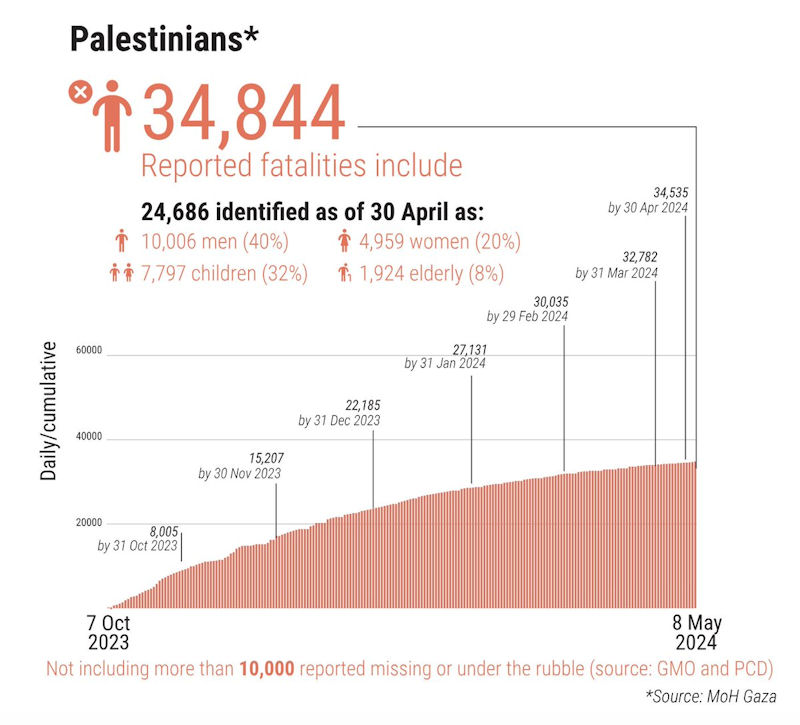
 Eurasia Press & News
Eurasia Press & News
